#and that's what i love about judaism. because you notice how often that theme comes up?
Explore tagged Tumblr posts
Note
hey! I love your blog and the things you post. I wanted to say that if you have questions about Halakhah or about anything else that is related to Judaism, I would love to help you! I'm not pretending to be a rabbi or something, but I know alot about Judaism. keep in mind that I'm an ortodox jew and not a conservative)
Orthodox jews 🤝 Every other jews
People I love with all my heart 🩵🩵🩵
(And thank you! 😭)
#ask#jumblr#jew by choice#jewish conversion#personal thoughts tag#this blog loves orthodoxy and i am really grateful for the kindness i've been shown by a VAST array of jews#from reform to conservative to orthodox to unaligned i have been shown so much love and i want to give that love back😭😭#i never know how to respond to this kindness but i want to make sure y'all do know how beautiful and how much i love your lives and judaism#i love seeing how vast - how differently each jew lives and observes and thinks about judaism#i love seeing all of them no matter if i completely agree. it isn't ABOUT agreement!!#we are united ultimately by that love and care - by the community outreach and intercommunity support#we become united when we reach across those superficial bridges in order to embrace each other#and that's what i love about judaism. because you notice how often that theme comes up?#humans can be bad about that! about reaching across bridges. and i know some of us need to learn how to love and BE loved#being loved is just as much a skill as loving and yet it's a skill we often aren't taught in tandem with learning HOW to love#anyway. rant has ranted long enough. but i just wanted to talk about this because judaism often does get this right#and i want this blog to be a safe and loving space for as many jews as humanly possible. because i love judaism and jews...#...and they are my INHERENT equal which will never change. it will never change that this will be what i think...#...and i'm saying that as confidently as i can because i want and try to put the work in to learn to love and be loved by jews
13 notes
·
View notes
Text
Gochiusa BLOOM episode 7 impressions
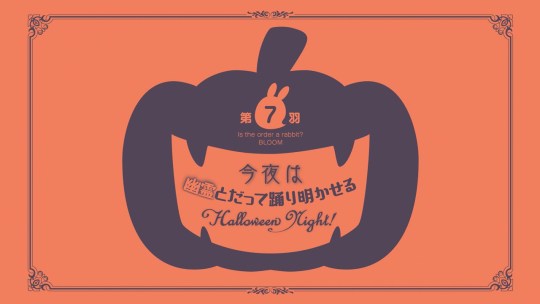
Previously: 6 - 5 - 4 - 3 - 2 - 1
In real world Halloween might have been a month ago, but in the world of Is The Order a Rabbit it’s exactly the season for all things spooky. And maybe things become a little too supernatural for a slice of life show. In the last episode we’ve seen how BLOOM symbolizes the growth of the characters. And as we enter the second half of the season, another meaning is revealed...
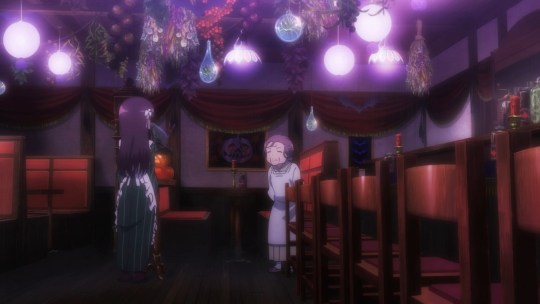
But first let’s visit Ama Usa An, where horror-loving Chiya is decorating the traditional Japanese teahouse for Halloween. Since Halloween is decidedly not a traditional Japanese holiday, it looks kinda surreal, but Chiya’s grandmother is more worried about souls of the dead coming back to life, especially that of Chino’s grandfather (see season 2 episode 9 for more of their backstory). Of course the soul of Chino’s grandfather isn’t actually dead, but is inhabiting the body of a rabbit. It’s not clear how exactly this happened and Cocoa might have been involved.
Speaking of Cocoa, we see her practicing with the magic set she bought in the first episode of the season. She tries to make something appear in her hand, but nothing happens. Clearly you can’t just learn to summon matter into existence in Gochiusa world, or can you? Anyway the shot focuses on a candy laying on a table before the opening sequence cuts in. This must be the object Cocoa has tried to summon and it’s also clearly a foreshadowing for something.

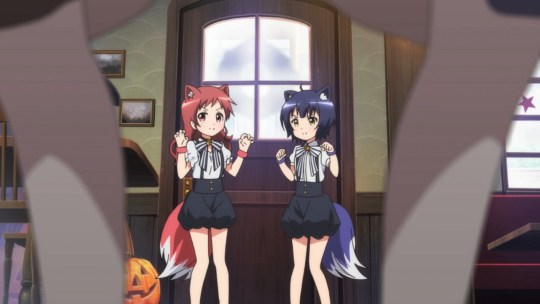
Meanwhile, Maya and Megu are trick-or-treating in matching werewolf(?) outfits hoping to score some free candy. Interestingly the tradition of giving out candy on Halloween has descended from a medieval practice of sharing so-called “soul cakes” which represented the souls of the dead.
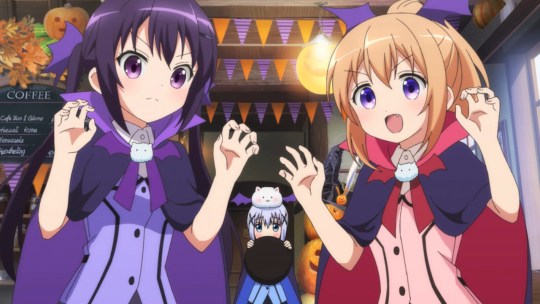
Meanwhile the staff of Rabbit House are dressed as vampires. The theme of vampires fighting werewolves brings up to mind the Twilight series although I’m sure the idea came up many times throughout history. If you look closer, you’ll notice that Cocoa, Rize and Megu have fake fangs (I think Maya’s is natural), although they’re not consistently drawn between scenes, even though in the manga they’re drawn correctly. Maybe they’ll fix this in BD. The only one whose fang is not shown is Chino, and ironically she is the one who actually bites somebody.
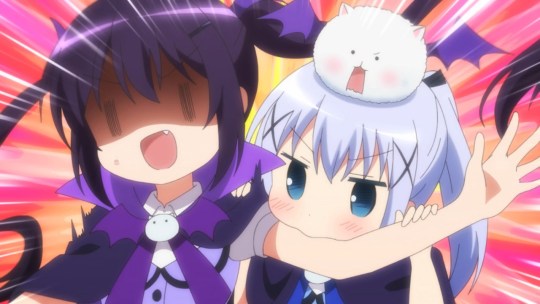
Also the flashback of Chino “roaring” at the mirror reminded me of the scene from Celestial Method where Noel (also voiced by Minase Inori) roars at a dinosaur standee. To be fair it sounds completely different but I just can’t help but compare them.
Also while I was browsing through my copy of volume 6 I found a cute illustration card that seems to be relevant to this episode, but includes Mocha and Cocoa as the wolves and Chino as the vampire (here’s a highres version).
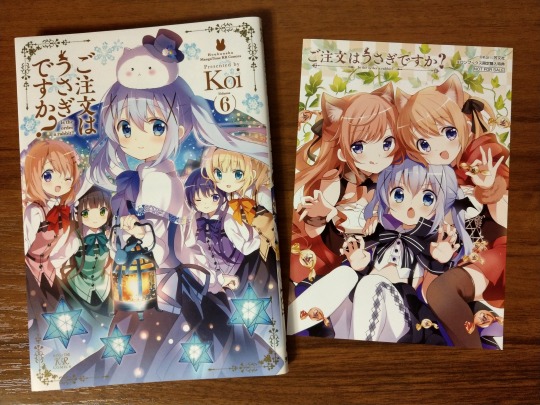
I think I bought this particular volume in Japan on the day it was released. Good times...
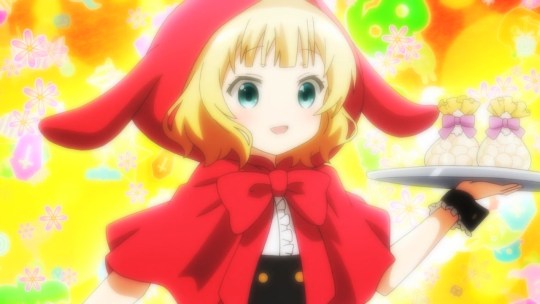
Next MaMe go to Fleur de Lapin and are greeted by Sharo dressed as Little Red Riding Hood (bunny version). This costume appeared earlier in an illustration for the rabbit chapter from the previous episode.

This is also a rare scene where other employees of Fleur de Lapin can be seen, as usually Sharo is shown working there alone. Even in the manga, Sharo is the only employee shown in this scene. In the end it turns out that Sharo is a wolf in disguise and craving for some meat. Which is weird because Sharo hasn’t been shown eating or cooking any meat before.
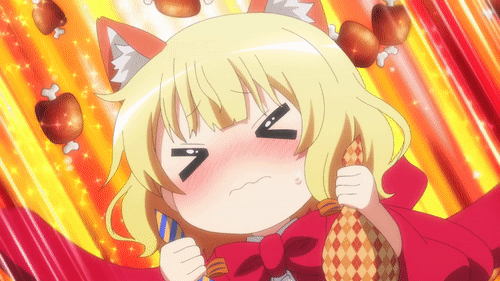
Anyway, next stop is Ama Usa An, which is called the Witch’s Mansion now. Chiya mentions the beginning of the Sabbath, and the manga chapter’s title 今宵は甘兎サバト also mentions the Sabbath. This might be confusing because in Judaism and Christianity the Sabbath is the day of rest and happens weekly (on Saturday or Sunday). However since we’re talking about witches, this actually references the Wiccan concept of sabbat, or one of eight festivals in the Wiccan calendar. In particular, Samhain, one of the four Greater Sabbats pretty much coincides with Halloween and celebrates the beginning of winter.

Chiya does this thing where the protagonist’s hand hurts only to awaken their dark powers, I’m not really sure where this trope comes from but I’ve seen it referenced in anime before and it’s a common chuunibyo stereotype. In this case, Chiya did really just hurt her hand. There’s also some sort of runic circle drawn on her bandages, but if you look closer it says shiratama anmitsu matcha parfait in hiragana.
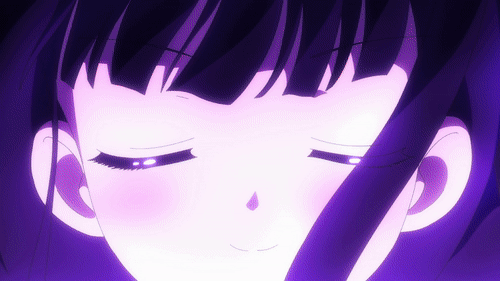
Maya and Megu agree to help Chiya, and become her “familiars”. Even though familiars are better known as a video game mechanic today (which is what the “level up” scene references), witches were associated with familiar spirits since medieval times. A familiar often took form of a small animal, such as a cat. Unfortunately MaMe don’t even know which animal they are, so clearly they didn’t take their backstory as seriously as Chiya did. Their ears and tails look canine to me, so I can see Megu being a fox spirit, but Maya being a cat is less believable. Also during their confrontation Megu confirms that Maya’s fang is her yaeba (snaggle tooth).
As a revenge for the trick MaMe pulled on her, Chiya gives them a selection of pumpkin tarts, one of which is laced with wasabi (which she calls ”Russian roulette”). This seems like a common thing for her, since she did the same with botamochi in season 2 episode 6, and with green tea in season 2 episode 7 (except she used aojiru instead of wasabi). However this time, it was Chiya’s grandmother who put wasabi in two of the tarts, unbeknownst to Chiya. By the way in the manga it wasn’t shown that Chiya got one of the wasabi tarts.

Chiya goes shopping for some pumpkins, but is helped by Rize, and later Sharo gives her anti-pain medications, reminding her of how Chiya tended for her when she was sick in season 1 episode 12. It’s not mentioned in the anime, but Rize also had a “motivation” for helping Chiya, as she hurt her leg before (see season 2 episode 2). Chiya invites Rize and Sharo to dinner and brings up the wasabi-laced pumpkin tarts. According to Chiya the probability of getting wasabi is 1/3. Initially there were 7 tarts, of which 2 had wasabi. Megu, Maya and Chiya eat one each, with Chiya’s having wasabi in it. That leaves 4 tarts with 1 wasabi, so either Chiya’s calculation is incorrect, or somebody ate one more tart.
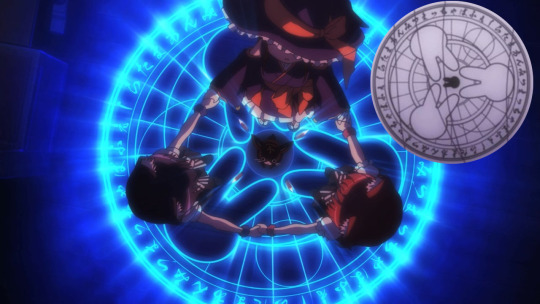
Apparently last day was just a warm up to Halloween (All Hallow’s Eve’s Eve?), so next day Megu and Maya come to Chiya again and try to summon something. A larger and slightly different version of the runic circle previously seen on Chiya’s hand starts glowing and we see that the 3 white rabbits correspond to three people holding hands. There’s also Anko corresponding to the black rabbit in the middle. By the way, in the manga the sign on Chiya’s hand was just a hexagram, and the summoning ritual didn’t have any visible symbols.
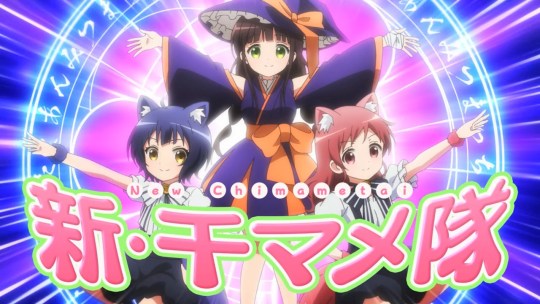
Anyway, they want to summon a messenger from demon world/hell, and coincidentally Cocoa and Chino come in (dressed as vampires) and try to attack (cuddle) them. Chiya, Maya and Megu form New Chimame-tai which works because Chiya and Chino have the same first syllable. However Chi is written with kanji instead of katakana in this version (because Chiya’s name 千夜 is one of the few given names among Gochiusa characters that’s always written with kanji). This defeats Chino, and Chiya consoling Chino like a big sister defeats Cocoa as well.
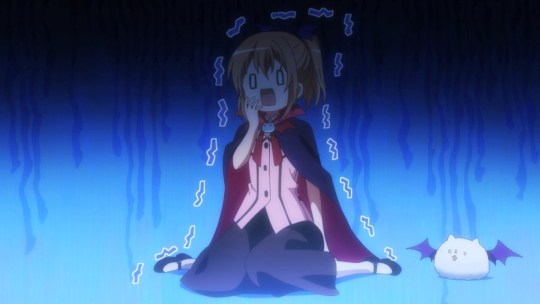
Ok let’s move on to part B, which is the really important part of the episode. The streets of the town are filled with people dressed in various costumes. Cocoa’s classmates can be seen among the crowd, and Aoyama and Rin are enjoying a boat ride on River Sanzu.
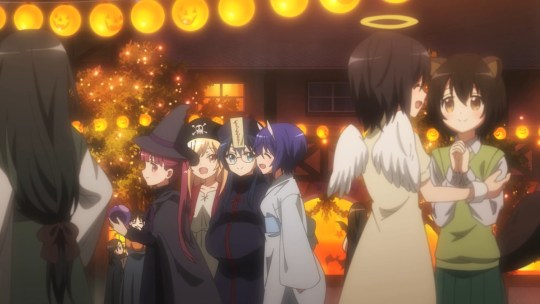
Our main character have also prepared some new costumes for the occasion. First we see Chino, dressing up as Phantom Thief Lapin, while Rize is going as a police officer. Soon Chiya and Sharo join them, who somehow independently of each other also went with a Lapin costume. At least Sharo had a good excuse. For Chiya, Lapin’s gloves obscure the bandage on her hand, so maybe that’s why she chose this costume. But what about Cocoa?
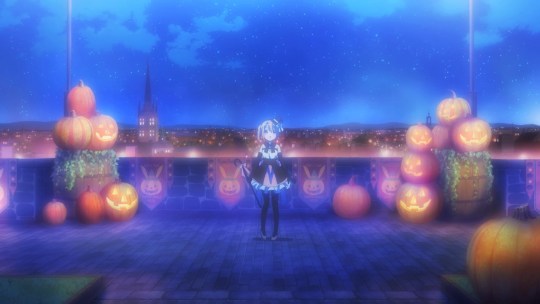
Well, she kinda got lost and we find her at the location that you will recognize if you read my episode 5 review. Cocoa says it looks a little different than usual, almost like a different world (isekai). Well, there’s a lot of evidence to support this hypothesis. First, in a scene that parallels episode 1, Cocoa finds a lost child and tries to calm her down with a magic trick. However you might notice that the child’s head is literally a pumpkin with a moving mouth.

And her mother is also a pumpkinhead. Cocoa doesn’t encounter any other people during this segment, even though you’d think a spot that overlooks the town like this would be quite popular. Well, she does encounter one more person, a mysterious masked magician with an angora rabbit on her head. She also wears a G-clef pendant indicating some sort of music connection.

Now, since y’all had already watched the episode, it wouldn’t be a spoiler to say that this is the ghost of Chino’s mother, Saki. The rabbit on her head is the ghost of the original Tippy before its body was taken over by Chino’s grandfather. The original Tippy was a female rabbit, by the way, a fact established early on in the series. In Sing for You OVA (for which I wrote a not-very-detailed review by the way) it’s established that Saki was a singer and even had a record released.
Anyway, as a ghost, Saki doesn’t speak (although she still can giggle and such) and doesn’t physically interact with Cocoa (only indirectly, by casting candies at Cocoa). Nevertheless she does teach Cocoa how to do the candy trick correctly.

Meanwhile, the rest of the group tries to call Cocoa’s phone but she doesn’t answer. This is another evidence for isekai theory. Cocoa is just out of range, you see. Rize and Sharo swap their costumes (the most unrealistic part of the episode) and Sharo starts “policing” the Lapins on how the real Lapin would talk. Chiya has a bright idea to shout out for Cocoa and call her big sister. However Cocoa would obviously only react if Chino calls her that, so Rize encourages Chino to say it louder (referencing her training for the choir in Sing for You).
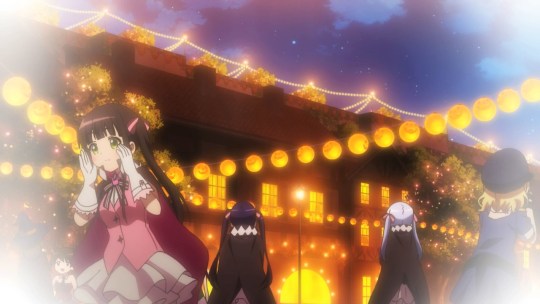
Cocoa and Saki hear Chino, and Saki looks at her daughter from the terrace. Chino also looks up... but doesn’t see anything. She does get a hunch that there’s something up there though, so the group finds Cocoa eventually. Meanwhile Saki feels like her time is up and makes for a quick exit, literally disappearing.

This is where Cocoa returns to the “real world”, as the current Tippy calls out for her. Why was Tippy with Cocoa anyway in the first place? Cocoa looks around and there are in fact lots of people there as expected.
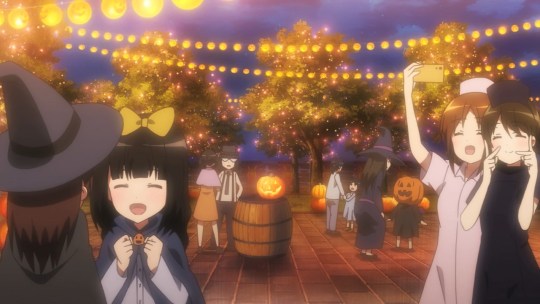
Cocoa thinks that Tippy speaking is an evidence of a ghost, despite her interacting with a real ghost just a few moments before. The 3 Lapins arrive and start arguing who is the real Lapin. Chino says that it’s the one who gets away with everything in the end, implying she will take the whole Cocoa for herself. However Sharo arrests Cocoa for making everyone worry.
On the way back, Chiya recalls the legend which was also mentioned by her grandmother at the beginning of the episode about the spirits of the ancestors coming back for this one day and then returning to heavens. Chino looks up to the sky, while Tippy gives her a solace in the fact that he was once again turned away, implying that he expected to return to heaven with the other spirits.

Tippy also seemed to know what Cocoa was talking about in an earlier scene where Cocoa said she forgot to give thanks to somebody. Just what’s up with Tippy and why is he not allowed to enter Heaven is a big mystery here.
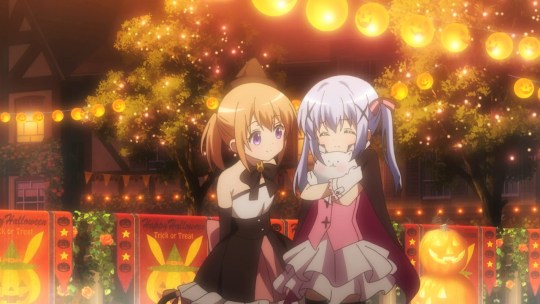
Cocoa also notices Chino being distressed and shows her the magic trick with the candy. It turns out Chino remembers this trick from her childhood, and we get to see a full flashback with Chino’s mother even getting a few speaking lines (delivered by none other but Nana Mizuki). Since the candy was probably a part of the magic set, it’s no coincidence that it has the exact same wrapper in the flashback. The color of the candy matches with Chino’s clothes at the time but you can also think of it as a combination of Saki’s white and Chino’s blue.

By the way, in the manga Cocoa conjures up two candies, and they have a plain wrapping so there wasn’t One Specific Candy like in the anime. Also in the flashback, Chino is carried by her grandfather. His face is not shown, but Takahiro is seen in the background (with Rize’s dad) so by exclusion it had to be him. And in the current scene Chino is the one carrying Tippy like this.
The episode ends with Cocoa asking Chino to tell her more about her mother, while a star is seen rising in the sky, presumably symbolizing Saki’s spirit.

Let’s go back to Cocoa meeting Saki scene one more time. Like I explained, it’s heavily implied that Cocoa isn’t really in the same world as the other characters when she meets Saki’s ghost. Of course Gochiusa had supernatural elements from the start, such as a certain talking rabbit who happens to be Chino’s grandfather. But now we have a ghost of Chino’s mother and Cocoa is the only one who can see her, but Chino can’t? Just what the heck is going on here?
But wait, there is a rational explanation for all of this! Cocoa had a hallucination triggered by all the Halloween celebrations. She imagines helping a lost child just like Chino did before (and told Cocoa about it later) and then imagines the ghost of Saki teaching her magic, because subconsciously she wants to be like Saki. She had seen Saki before on a photograph, but haven’t heard her speak, which is why the ghost can’t talk to her. Hearing Chino call her onee-chan brings Cocoa back to her senses. But how did Cocoa learn the trick if it was just her imagination? Well, consider the fact that she was practicing this exact trick at the beginning of the episode. By the time she shows it to Chino, she has already practiced it a lot of times, but maybe she only realized the crucial part (feint) during the hallucination. Either way, the blue striped candy wasn’t given to Cocoa by Saki, she had it from the start, as part of the magic set! The candies that Saki uses to show the trick to Cocoa all disappear when Cocoa returns to reality.
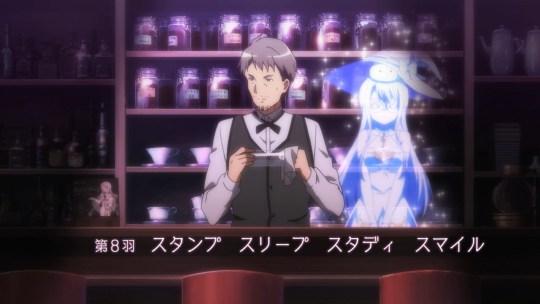
Saki appears one more time in the bar time scene with Takahiro, who is listening to her record Silver Spoon from Sing for You OVA and then calls her by name. I think this is the only time the name “Saki” is mentioned in the show itself, and it’s not mentioned in the manga at all (unless maybe in some recent chapters which I haven’t read yet). The first time it was revealed was during April Fool’s day Clockwork Rabbit event, as a solution to a “puzzle”. Her name is written in katakana as サキ, however one of possible readings of the word “saki” is 咲き which means “bloom”. Now consider how the last few seconds of the opening animation it cuts from a blooming field of dandelions to Saki:

The dandelions connection to Saki was previously seen in season 2 episode 1 and Sing for You. Saki’s character design doesn’t really say “blooming of dandelions” to me, but consider that a dandelion turns into this:

Now that’s more like it! Although it reminds me of Tippy as well. Anyway, that was a very mysterious episode of Gochiusa BLOOM and let’s see what happens next! Only 5 episodes remain...
11 notes
·
View notes
Photo

Starsky is Canonically Jewish - A Moodboard & Analysis
A detailed exploration of all the Many Many aspects in the canon that point to Starsky being Jewish can be seen under the cut + bonus headcanons!
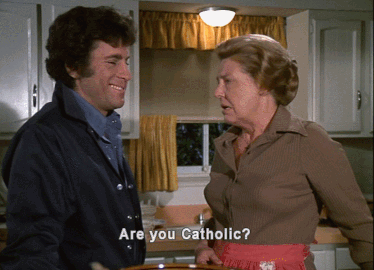
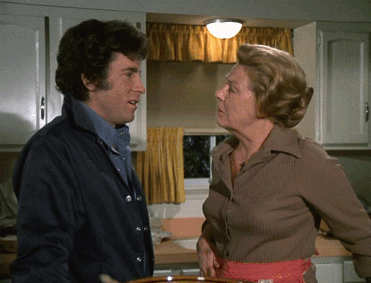
So I was looking at Starsky’s fanlore page and the discussion there talks about hints within the canon that Starsky may be Jewish. As one commentator notes, “There is plenty of mild justification for Starsky being Jewish”. Tbh, I’d say that, whilst subtle and never explicitly addressed, there is far more than just mild justification to suggest that Starsky is Jewish, and that he is in fact canonically so (and also I found the menorah they were talking about and I felt like I was on Myth-busters, which I’ve never seen but I imagine they mainly investigate fandom hearsay regarding background menorahs and other such suggestions. I’m insanely proud for having found it please appreciate because it took me a Very long time to, although I’ve found in researching this that there was at least one screenshot of it online here from 2011 :D).
TV Tropes has Starsky down for the Ambiguously Jewish trope and whilst I definitely agree that Starsky fits this trope description, I would say that there really is nothing ambiguous about it. There are just so so many aspects that come together. This boy is just canonically Jewish!
(Disclaimer: I’m not Jewish. Although I am very much considering converting and I’ve been studying everything I can about Judaism for well well over a year or so now, as well as attending services through whatever means I’ve been able to, I am by No Means even remotely close to being knowledgeable on the topic. Still, I figured there were some things I’d noticed whilst watching that hadn’t been mentioned that I wanted to bring up, and I also wanted to pull together observations by others into one place because I’m always hyped for canon representation and creating coherent resources. Extensive Research Is My Jam. If I’ve got anything wrong; said something in an uncomfortable way; talked where it wasn’t my place to talk; made assumptions I shouldn’t have; or like, said/done literally anything else that feels even slightly off then Please Please say and I’ll do everything I can to sort it!!)
Reasons why I reckon Starsky is canonically Jewish:
For one, Paul Michael Glaser is Jewish and if William Shatner being Jewish is good enough for my Jewish!Kirk headcanons then it’s sure as heck good enough for my Jewish!Starksy headcanons. Furthermore, according to Wikipedia, both Leonard Goldberg and Aaron Spelling are Jewish, and a good many of the writers have Jewish surnames too, though I can’t find out much about them specifically. Due to their fame, and therefore extended biographies, Wikipedia does specify that writers Michael Mann, and Fred Freiberger are Jewish. Joe Naar, who produced the show, was also Jewish, and used to joke that his style “was born out of being a short Jew with a huge chip on his shoulder.” Rick Edelstein was hugely involved in the writing of the later series and you can really see the influence Judaism has on his work, as is evident in his more recent short story, Bodega. He also ended his short video supporting Obama in '08 with "l'chaim, to life".
Essentially, I think Jewish people were involved in all levels of production within the show - from the writing, to the acting, to the direction, to the production - and this can be seen in the varied means by which it’s suggested that Starsky is Jewish himself. As such, suggestions that may have been seen as accidental otherwise can then take on greater significance, whilst the more explicit examples take on more emotional weight.
Why, then, would it not be more explicitly stated that Starsky is, and was always considered to be, Jewish? I read a really interesting post the other day about how Jewish people in Hollywood often felt unable to include Jewish characters/actors/themes in their work out of fear of seeming too “tribalistic, or insular, or that Hollywood was (as it was in the antisemitic imagination) a ‘Jewish’ front”. Obviously, I can’t comment from a Jewish perspective, but when I was younger I felt similar pressure in regards to including queer characters. As such, I think it’s really exciting to see the very explicit references to Starsky being Jewish, even if they aren’t clearly obvious to a wider audience not actively looking for such references.
Paul Michael Glaser also played Perchik in Fiddler on the Roof (1971) - which I mention not only because it shows Glaser playing other Jewish roles, but also as a recommendation because I Love My Hyped Wee Jewish Communist Revolutionary Boy. Glaser talked about how Starsky was a culmination of other characters he’d played prior to Starsky (DVD extras) and I think this is quite evident in Starsky and Perchik’s respective behaviours. As a nod to this, the middle top picture is (apparently) from a Jewish Labour Bund publication. This is something you can learn more about on its Wikipedia article here, and there’s more interesting things about The Bund here and here as well!
As we all know, Starsky calls Hutch the Blond Blintz (to his Puce Goose) :D Here’s a recipe for blintzes from myjewishlearning.com - they’re like pancakes and it’s an Ashkenazim custom to eat them on Shavuot. Also I love the scene in The Set-Up: part 1 where he first calls Hutch the Blond Blintz and Hutch is like???? and Starsky just says Blintz very definitively and with no further explanation and Hutch is just like,,, u kno what,, I’m just going to roll with this.)
I basically just really love this because it’s an example of Starsky being very openly and explicitly involved in Jewish culture, not just when he says it in The Set-Up, but also in Starsky’s Lady, when playing with the kids, especially as there aren’t a lot of references to things that carry on across multiple episodes.
I also like the way he pulls everyone else into his reference of it very un-apologetically; it feels very in character. There’s a picture of a blintz in the left column of the middle row! (Also, I feel like,,,, there might be some,,,, Freudian Implications to naming your partner after a rolled pancake filled with cream cheese that gets released when eaten?? @jimmyandthegiraffes fite me.)
Whilst Hutch looks at a glow in the dark cross being sold by Huggy in Jojo (written by Mann), Starsky picks up a mezuzah, which are put up at gateposts and door frames in Jewish homes - here’s a video about it :D The picture in the left-most bottom corner is Starsky inspecting this mezuzah. I really like this scene because he goes straight to it and seems to be considering it with very real interest. This is interestingly contrasted with Hutch picking up the cross, which isn’t the only time the show appears to draw a distinction between their respective cultural and religious heritages.
I think that really responds to some of the stuff William Blinn has said about their casting and how thrilled they were to have two actors playing characters from such different backgrounds whilst having such great chemistry, and how that really helps form the magic of the show even (DVD extras). I think their respective choices really help to demonstrate how assumed it was that Starsky Would naturally pick up a mezuzah, in contrast to Hutch’s cross.
The menorah (or actually Chanukkiah if we’re going to be really specific about it) in the background of Starsky’s apartment in Foxy Lady and in Blindfold. For so long I thought this was a myth but!! it’s not!!!! You can see it in the right hand column, middle row :D With the greatest thanks to the canon compendium for pointing out the episodes it appears in and also for like, literally everything else - it’s genuinely just the best fandom resource I’ve seen. I love this because I think, asides from a Magen David (Star of David), I think a menorah is one of the most well known symbols of Judaism and I think it’s really rad that it’s something the crew thought consciously to include, even if it is a largely not shown background detail. Again, it’s subtle but explicit which is why I would argue that Starsky is canonically Jewish.
It’s also worth remembering that even though it’s in an area in his apartment that doesn’t get shot by the cameras except on a few occasions, it Is a part of the apartment that’s Really visible from like, every direction and is right across from the front door. I’ve got another screenshot below from Blindfold that puts it more in context of where it is. I think this is really cool!! It’s obviously something he considers a big enough part of his life to keep on display year round and it’s something instantly recognisable and visible for anyone coming into his house (Foxy Lady came out on March 1st and Blindfold on October 21st, neither of which are around Chanukkah, if you’re going by episode air dates).
Speaking of the Magen David :D As can be seen in the episode Little Girl Lost, Starsky has a couple of blue six pointed stars on his dash under his Christmas decoration, as you can see in the top left hand corner of the mood board. I think this is really cool because Starsky is obviously very hyped for Christmas in this episode, hanging reindeer from his mirror and singing Christmas songs and being really hyped for presents, and this could be used to suggest that Oh No He Can’t Be Jewish He Likes Christmas, but not only does he only engage in secularised aspects of Christmas (in contrast to the nativity scene at Kiko’s house), there’s the very conscious inclusion of these stars. All the scenes in the car are set during Chanukkah, which ran from 16-24th December in 1976, and the stars are blue, which, along with white or silver, is often used for Chanukkah decorations and is traditionally associated with Judaism. Basically this remains in keeping with the subtle yet very conscious inclusion of Jewish symbolism, easily missed by those not thinking to look for it.
Also I know heaps of Jewish people that enjoy the secular aspects of Christmas, particularly if the holiday has meaning for their friends. In Starsky’s case this might be more because he wants to annoy Hutch and he likes bickering or perhaps because he’s upset by Hutch’s increasing cynicism and wants Hutch to feel happier. Or because he wants a new caboose for his train set. Probably that.
In the bottom left hand corner you’ll see a picture of Paul Muni, born Frederich Meshilem Meier Weisenfreund, Meshilem being his Hebrew name. I just like that Hutch suggests Starsky’s mother called him Rudolph Valentino and Starsky corrects him saying she “said I was more of the Paul Muni type”, suggesting the actor she compared him to was actually a notably Jewish one (Paul Muni references can be found in Lady Blue, as written by Mann, and Silence). Again, I think the contrast between Hutch suggesting a gentile actor, and Starsky raising a Jewish one instead is interesting, as well as highlighting Starsky’s mother’s engagement with, and perhaps predisposition towards, Jewish culture.
On it’s own this is perhaps more of a curiosity, maybe too much opportunity for coincidence to really warrant too much attention, but Dobey also chooses a Jewish comparison in The Velvet Jungle when he says, “who do you think you are, Starsky, Milton Berle?” So here we have two instances wherein the comparisons drawn with Starsky are with other Jewish personalities.
In Terror On The Docks (written by Freiberger), Huggy apologises for not bringing an ill Starsky chicken soup, instead bringing mustard green broth which, “where I come from is just as effective”. This might not have much significance in and of itself, except that literally just 2 episodes later, in Shootout, Sammy Grovner makes a joke about chicken soup being Jewish penicillin. In addition, Huggy’s reference to his own culture’s cure-all suggests that chicken soup would have been the culturally appropriate first-choice for Starsky. As such, I’ve included a picture of matzo-ball chicken soup in the top left hand corner.
Also, in The Game, Hutch says in regards to their soup related upbringings that, “we obviously had different mothers” and Starsky says, “yeah, mine was chicken soup, yours was,, clam chowder”, which isn’t really that important except that the show likes to highlight their different cultural upbringings and once again they’re doing so by referencing something that is widely culturally understood to be Jewish, having already explicitly stated it within the show to be so. (I could write a whole dissertation about cultural soup references in Starsky and Hutch, but I’m not going to. Just note that there are a weird amount of them.)
We see in Running that Starsky calls his mother every Friday evening. I think this is really interesting because, if they were both observant orthodox, they wouldn’t be using electricity on Shabbat. I mean, duh, Starsky is Not observantly orthodox but this scene shows that neither is his mother. Any yet, the time they’ve picked to talk each week is on Friday evenings, when many Jewish families come together for Shabbat dinner. As such, I think this shows how Starsky’s Judaism holds a place within his life and his routines, as well as suggesting what tradition he may have been brought up in. I personally headcanon conservative, but Reform works too!
As the fanlore page says, “Starsky looked stunned when Nancy's mother asked him if he were Catholic in 'Terror on the Docks,' to which he replied he was not.” This scene is a really interesting one to watch for this (and, again, was written by Freiberger), and whilst this merely shows that he’s not Catholic, his confusion and bafflement suggests just how surprising this question is to him, and his discomfort is evident as he laughs awkwardly. I think this is an experience many minorities can attest to, and he’s feeling the unease that comes when you’re put under pressure to reveal a part of your identity that may well be not received well.
In terms of the canon, I think the way in which this is played is so in line with the concept that Starsky is Jewish that it really suggests that this was something in clearly in mind in regards to his characterisation, at least by a number of the people working on the show.
In terms of headcanons, I like Starsky’s bewilderment here because it seems like he straight up just thought it was obvious that he was Jewish, and so it offers an in-universe explanation for why he never says “I’m Jewish”, rather than the external explanation regarding the fears surrounding creating explicitly clear Jewish characters in the 1970s.
It is interesting, in universe, that he doesn’t then say, “No, Mrs. Blake, I’m afraid I’m Jewish”, but I think this shows Starsky’s reticence to talk about his background with strangers, despite his comfort proudly talking about blintzes with Hutch and Terry. This is frankly just understandable, given the existence of antisemitism and Mrs Blake’s evangelical Catholicism, and again offers another explanation for why he never says I’m Jewish, wherein everyone he feels comfortable knowing already know, so there’s no need for him to say that.
(This said, @jimmyandthegiraffes and I headcanon that he just explains everything he doesn’t know with the fact he’s Jewish, even when it’s totally unrelated, *queue Starsky’s sage voice* “Ah see, I wouldn’t know whether those out of date eggs are safe to eat because I’m Jewish.” - Hutch is going to throw something. Also saying he can’t eat something healthy Hutch has made because it’s not kosher, whilst eating something obviously treif, which I made a post about here.)
We also see Starsky’s reticence to talk about his background with antagonistic strangers/suspects in The Committee, “Starsky? What is it, Polish?” “Something like that.” And yet, in Starsky And Hutch Are Guilty we see Starsky talk with Sharon, with whom he obviously feels comfortable with, about his home cooked goulash, “My mother gave me a recipe straight from the old country.” Again, this shows an in universe explanation for why we never see Starsky talk about his background explicitly, as those who he feels comfortable knowing already know.
This line is also interesting as it suggests information about Starsky’s heritage that pretty clearly implies a family with an immigrant background; this again would be in line with the experience of many Jewish people in the US, particularly when considering Starsky’s roots in New York as many families settled there fleeing pogroms and persecution. I headcanon that Starsky’s father was killed just after his 13th birthday (and his Bar Mitzvah) and moved to Bay City the summer after (this is taking Glaser’s birthday as Starsky’s for consistency).
This would mean Starsky lived in New York 1943-1956. The Jewish population of New York was at its peak in 1950 at 2 million. Still today, New York City is the largest community of Jews in the world within a city proper, including Tel Aviv. I think it perhaps goes without saying that this was and is particularly true in Brooklyn. I’ve seen lots of fics argue about where about in New York Starsky is from (with one claiming New Jersey which was pretty left field). The closest connection to New York that I have is that I grew up on the outskirts of the city it was named after. If you ever want to visit York, it has a lot of chocolate museums and a nice Gothic cathedral and a bad connection with Jewish history. I’m on a tangent. My point is, although I can figure Yorkshire accents, I’m not especially good at figuring out the nuances of New York accents so I leave it up to you lot, and on the whole people tend to suggest that he has a Brooklyn accent. We also know he has swum at Coney Island, and that the sea there tastes better than on the playboy island (Murder on Voodoo Island: part 2).
What we do know is that Starsky grew up on 84th Street (Targets Without A Badge: part 2) although there do seem to be a Lot of 84th streets in New York. We also know that if we are agreeing on Brooklyn then 84th street runs through Bay Ridge, Dyker Heights, and Bensonhurt. I figure Bensonhurst works best because, even though it’s a very Italian neighbourhood now, until the 50s it was a Jewish/Italian neighbourhood, which works with Starsky’s grandmother’s flat above the Italian restaurant (Shootout). It also works with the implications surrounding Starsky’s family and the mob (The Set-Up: part 1) as the Bath Avenue Crew operated in Bensonhurst. The mob thing is also interesting when considering Starsky’s Jewish heritage. There’s a painted Bensonhurst shop front in the bottom middle of the mood board which has been kept the same since the 1950s when Starsky could have been living there!
This has all been largely (or wholly) tangential, but essentially my point is that what we know of Starsky’s heritage chimes pretty neatly with the experience of many Jewish Americans, which again ties in with the argument that Starsky’s Judaism was something held in mind by those involved in the creation of the show.
Another thing I found interesting was in an article I was reading about Paul Simon, born less than two years before Glaser. In regard to Simon, Donald Fagen says, “There’s a certain kind of New York Jew, [...] almost a stereotype, really, to whom music and baseball are very important. I think it has to do with the parents. The parents are either immigrants or first-generation Americans who felt like outsiders, and assimilation was the key thought — they gravitated to black music and baseball looking for an alternative culture.” Simon responded to say that this wasn't too far from the truth. Obviously, Starsky enjoying baseball does not at all mean anything about him being Jewish, but it does fit in with his Jewish New York upbringing, from his father taking him to see the Yankees and him collecting baseball cards (Vendetta), to his enthusiasm with Pete (Little Girl Lost).
It is worth noting how this enthusiasm for baseball seems to be something that Starsky engages in far more than Hutch, which is interesting given Soul's history with the sport. (I feel like they definitely could have done more with the fact that David Soul was a good enough player to be offered a contract with the Chicago White Sox). Perhaps this wasn't pursued because a passion for baseball was thought to be more in line with Starsky's upbringing, versus Hutch's Sea Scouts. Again, this maybe suggests a certain narrative held in mind regarding Starsky’s background and how it influenced his characterisation.
Curiously, any Yiddish on the show is typically said by Hutch rather than by Starsky. In Vendetta, Hutch says to Artie Sorkin, “Fagin, faigeleh. What’s the differences? You’re vermin.” Faigeleh meaning homosexual. Also, as the canon compendium notes, “Hutch calls his houseplant ‘Meschugah Mantherlus.’” ‘Meschugah’ means crazy in Yiddish. “‘Mantherlus’ doesn’t translate as anything but is probably an inside joke and supposed to sound Latin.” (Ballad for a Blue Lady, co-written by Glaser.)
Largely I just found this interesting, but I did read a really cool study talking about the use of Yiddish in the American vernacular and one of its many findings was that gentiles with close Jewish friends were, unsurprisingly, more likely to use more Yiddish terminology. Also, unrelated but super fascinating, LGBT+ people were more likely to use Yiddish too.
On the Jewish immigrant experience, in Partners Starsky tries to get Hutch to play Pinochle with him, claiming "you love Pinochle", suggesting this is a game they frequently play together. Pinochle used to be a favourite card game of Jewish and Irish immigrants. I get that at this point I'm probably clasping at straws but I'm going for as comprehensive as possible, and I think it creates a good story about Starsky playing it with his family and later teaching it to Hutch.
It is interesting how Hutch is possibly shown to be engaging with Jewish culture in regard to both his use of Yiddish and his love of Pinochle. This may well be because Jewish culture permeates American society, after all it's Soul we see say the Yiddish "putz" in the bloopers. But it is slightly interesting that these were lines given to Hutch, perhaps for plot purposes, or because the writers were choosing to include their own culture and ways of speaking in a way that is safer through the evidently gentile Soul rather than the conspicuously Jewish Glaser.
There are other instances of Judaism in Starsky and Hutch that aren’t necessarily pointing to Starsky being Jewish but that are notable. Huggy Bear and the Turkey starts with Starsky and Hutch undercover in Caplan Laundry, where Hutch seems to be undercover as an orthodox Jewish man (and Starsky his wife? Seemingly? They certainly uh, go for it in the bloopers).
Caplan/Kaplan is a surname found in a number of cultures but it is a common Ashkenazim surname which also makes me headcanon Officer Minnie Kaplan as Jewish because we all want more Jewish headcanons in our lives and I think it puts her friendship with Starsky in an interesting context. (Marki Bey more like Marki Bae)
Again, it's Hutch we see taking on the more visibly Jewish role, although this does not go to negate Starsky's own Jewishness, as this may well be understood to be his influence on the friend he spends significantly more than 75% of his time with. Also, it can be assumed that Starsky is undercover as a Jewish woman as he appears to work at the launderette.
Obviously A Body Worth Guarding is the episode that deals most with Judaism as the Jewish protesters are a central plot feature. It’s interesting that Starsky’s involvement with them is largely hostile, however, I think this is more to do with the circumstances. At first he believes they’ve hired muscle to hurt Anna so he goes in hard which means the Jewish Organisation for Action respond with a more hostile approach. And yet, he’s completely on-board with dropping the JOA lead and following the fascist one as a result of Kauffman’s logic that attacking Anna would only lead to more antisemitism, which despite being a sound argument had no actual evidence to support it. From this point Kauffman is still resistant to working with Starsky which means Starsky maybe is more heavy handed in his approach, but it is on order to get Kauffman to help him follow the fascist lead. Once the job has been done he seems a lot softer towards the JOA and genuinely thankful for their help.
Essentially, the episode is noteworthy but Starsky’s reaction to the JOA tells us not so much about his own personal beliefs and upbringing and more about how he approaches his job. I do think it interesting that he believes Kauffman’s logic and subsequently drops all suspicion of the JOA and instead trusts him enough to bring him in as help.
Also Huggy calls the JOA the “desert people” which might just be Huggy’s turn of phrase but I think it feels more comfortable if Starsky is Jewish as it’s more like banter between friends then.
In spite of all these very purposeful allusions and references to Starsky’s Judaism, in Savage Sunday he complains about having to work on a Sunday, the Christian sabbath instead of Judaism’s Shabbat. And yet, I don’t believe this undermines Starsky’s Jewish presentation as it seems that his complaints are more that he expects to have Sunday off because he is in a Christian society which usually allows him a break on a Sunday to which he can look forward to. When he’s complaining about working on a Saturday in Jojo (written by Mann), Hutch says, “Could be worse, could be Sunday”, to which Starsky replies, “Come on, Saturday’s bad enough”, bemoaning all the sports that he could be watching instead.
This is interesting too as you could easily use this to headcanon him using sport as an excuse to express his frustrations at having to work on Shabbat, especially as it’s Hutch who says, “Could be worse, could be Sunday.”
Note: It was mentioned on the fanlore page that Huggy gives Starsky a wreath of garlic ‘for those of other persuasions’, but, as far as I can tell, the garlic is to ward off vampires of “all the rest of the denominations” when the cross for “any vampire of Christian persuasion” won’t be of help, rather than the garlic being for non-Christian vampire hunters. As always, I’m loving Huggy’s enterprising approach to religion, making sure he covers all bases, but it’s not really a suggestion that Starsky is Jewish, just that he needs to protect himself from non-Christian vampires.
In the same vein, Huggy does say “Shalom” to Starksy (and to Hutch) in Dandruff, though this seems to be more as an aspect of his undercover role as Prince Nairobi.
Essentially, Starsky is frequently presented as engaging with Jewish culture, practices, and traditions, often very visibly so. Aside from the very explicitly Jewish references, Starsky is very frequently characterised in a way that suggests his being Jewish was held in mind, on a writing level, an acting level, a direction level, and a production level. As I mentioned earlier, American society in imbued with Jewish culture and so many of these things may have been purely incidental. However, coupled with the more explicit examples of Starsky's Judaism they may be said to take on greater purpose and subsequent significance. Pretty much across the board, he is understood to be Jewish and whilst these references maybe subtle enough to pass by those not engaged with Judaism or considering it a possibility, this does not preclude Starsky’s Judaism from being a very knowing and explicit inclusion, and therefore canon.
Given all this, I have some headcanons about to what extent Starsky is practising!
We canonically know he doesn’t keep kosher – I mean this boy eats linguine with clams. I have read a fic where Hutch is forbidden from telling Starsky’s ma that he eats bacon or meat with dairy and I really like this as a headcanon. I definitely think she Knows but she lets Starsky pretend he doesn’t because it keeps him happy.
We also know neither he nor his mother have qualms about not being shomer Shabbos, but as I mentioned earlier, we Do see them using Friday evenings as the time they choose to call one another.
We know he doesn’t wear a kippah on the regular, too. And he never says the Sh’ma out loud if he thinks he’s about to die, although I do think he probably says it to himself. Again, I think I’ve read a fic about that. As I reread the ones I have bookmarked I’ll add them in if I can find them.
Other than these examples, pretty much everything else as far as I can tell is fair game, particularly if you’re considering along the lines of Reform, or even conservative, depending on the community. I know a lot of Jewish people who would consider themselves to be actively practicing who don’t keep kosher or who work on a Saturday etc.
About that, as I mentioned above, we know he does sometimes work on a Saturday (and he complains about it). This suggests that he doesn’t necessarily frequent synagogue regularly, particularly as he was frustrated about missing the sport he likes to watch on a Saturday.
However, for one thing, this doesn’t mean he Never goes to temple, and for another, we do know that Starsky very likely celebrates Chanukkah, due to his Chanukkiah. Chanukkah is a relatively minor Jewish holiday and so if he celebrates this it’s likely he also celebrates other, more significant holidays, and high holy days. Maybe he doesn’t go to shul every week, but a synagogue on Yom Kippur is generally full of people who are not regular attenders.
Please imagine this boy trying to fast I bet Hutch would be glad as hell that Starsky isn’t at work lol.
Personally, I tend to headcanon that Starsky moves to greater observance post Sweet Revenge. I think the hospital rabbi is good at playing Pinochle and the two become friends and they have good philosophical debates and Hutch joins in and after Starsky is discharged they want to see the rabbi so they start regularly attending shul and they both find something they can get out of it, especially as I headcanon that they retire from the force I think it gives them a community. For Starsky, I think it gives him a connection to his heritage and his family and maybe his father in particular, as well as a focus on social justice work through the synagogue so that he and Hutch can still feel like they’re making a difference. Tbh, I think that Hutch might find a lot to connect to in Judaism, maybe in the way it’s focused on making a difference in the here and now and not in order to access some afterlife. To be clear, I don’t think that’s necessarily the angle Christianity takes but I think it is how Hutch might perceive it and I think he might find Judaism more grounding in that respect. Also, if he converts then Starsky’s ma would be thrilled that if he hasn’t found a nice Jewish girl then at least he’s found a nice Jewish boy and Starsky will tease that Hutch’s hair is so long he might as well be a girl. I think it would create a really interesting relationship between Starsky’s ma and Hutch where they talk about Judaism and she introduces him to recipes and books and stuff and later Hutch is showing Starsky and he’s like, how come Ma never showed me?! And Hutch is like, she tried to idiot you just got distracted. And they can just, explore stuff together. It’s really soft.
Also, I think they host Shabbat dinners every Friday and it’s really cool because it’s a way that they can stay in touch with the Dobeys after they’ve left the force, and how they can stay close with Huggy when they’re not visiting for tips every other day. Also Kiko and Pete can come and then stay the night and spend Saturday with them maybe to give Mrs. Ramos a break. Minnie can come too and say the prayers!! Plus Paco Ortega and Joey and tbh any number of the other kids they’ve accidentally adopted over the years.
Pesach at theirs is just, the fullest house you can possibly imagine I love it. @jimmyandthegiraffes came up with the idea that there isn’t space for Dobey and the boys are like, oh you’re sat on the counter and he’s like? But there’s an empty chair and place set out here?? And he goes to sit down and everyone is like, nOOoO that’s for Elijah!! You cAnt sIT in Elijah’S plaCe?!
Gosh I love them
Starsky high key calls the new year “secular Rosh Hashanah”
Even though I personally headcanon a greater observance after sweet revenge, there really is nothing at all to say he isn’t at least somewhat practising over the course of the series and even that he is, given the Chanukkiah and what that means about holidays. I like how he keeps it up year round to maybe keep in mind his faith/upbringing/background.
I think it’s interesting that many of the fics that engage with Starsky as Jewish often suggest that he’s not religious, which is of course completely possible. However, just because he doesn’t ever talk about a faith in God doesn’t mean it isn’t present, especially when faith is often something so private and proselytising isn’t a part of Judaism. Personally I think that Starsky does have faith in God throughout the series and after, and this does impact his relationship with Judaism prior to Sweet Revenge as he considers things like the mezuzah and engages with Jewish culture, but that it’s after Sweet Revenge that he starts engaging with his faith more as connected to Judaism and religious traditions, rather than I’m going to celebrate my culture and upbringing and also I have a faith in God. He sees the two as more connected perhaps? and his faith as having a more direct impact on his life.
I really like how Huggy says the thing about the chicken soup too, and the “desert people” line is made a lot sweeter by thinking of him as a cool supportive friend who Starsky has known for a long time and who typically engages with Judaism specifically because it means something to Starsky.
I seemingly have a lot of thoughts on this.
Also, I really like how he calls him blintz, weird Freudian implications aside, especially because blintzes can be eaten at any time but are typically associated with Shavuot and I like the idea that Starsky has really a really fond association with his religion but also with Hutch. I really like the idea that if Hutch converts then the two can stay up all night together, eating blintzes and cheese and Hutch can maybe read aloud for my dyslexic boy.
Essentially, I just really love thinking about this and I think there’s more space for an actively practising Starsky than there’s generally understood to be, religious or not, even over the course of the show. Especially if you consider Reform Judaism. But tbh just give me Jewish!Starsky fics and I’m happy whatever they’re like.
I’ve worked really hard to find each scene I’ve mentioned on my DVDs (this post has taken me literally So Long to write (9 months-ish? it’s my Child) and I’ve researched it far Far more than I do my uni assignments whoops), so you can be sure I’ve checked to make sure each reference is legitimate. If you want to see screenshots of these quotations, or you want to know whereabouts in the episodes they occur, then message me! If you have additional examples or you disagree with me or if you’ve spotted a mistake then share that too!
With all my thanks to my partner Chester who’s put up with me banging on about this and spending Hours and Hours being ridiculously pedantic in the hopes of creating as coherent a resource as I can. They’ve also contributed so much and just they’re rad. I also cannot thank enough the canon compendium for helping me fill in all the blanks and pointing me in all the directions I needed to go in, I Genuinely cannot think of a better fandom resource. Also the first 3 seasons scripts are available here which is a huge help.
tldr; Starsky is irrefutably, canonically Jewish and also I love him
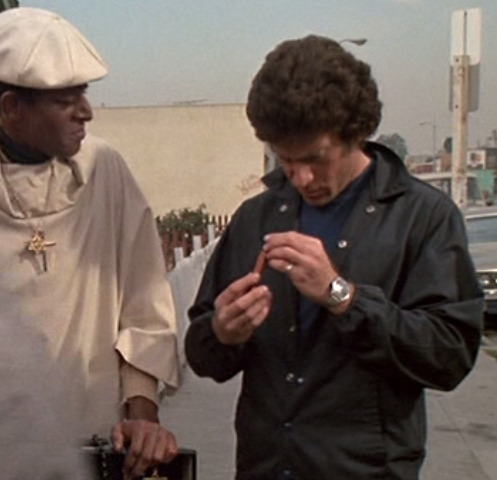
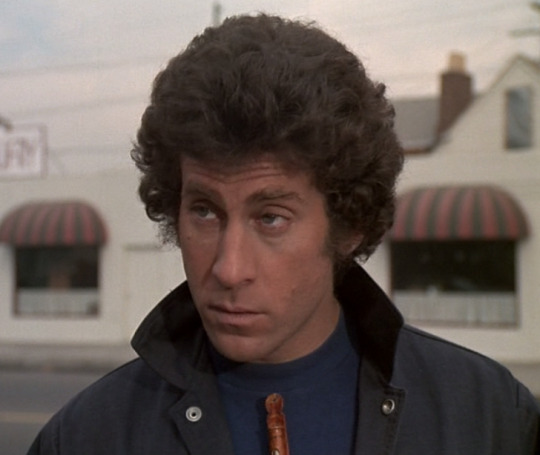
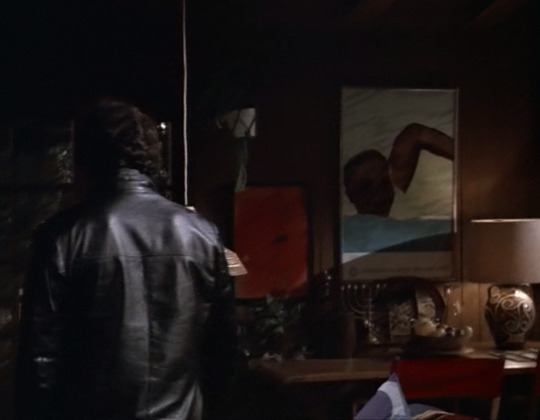
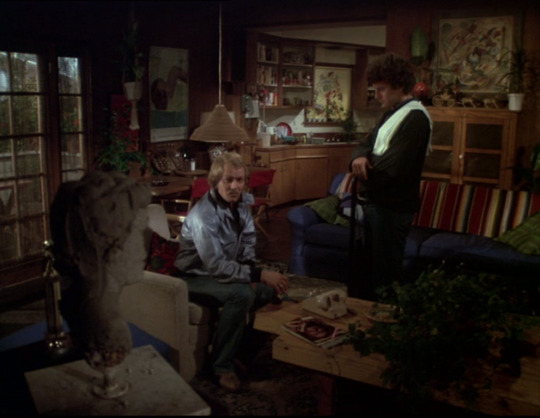
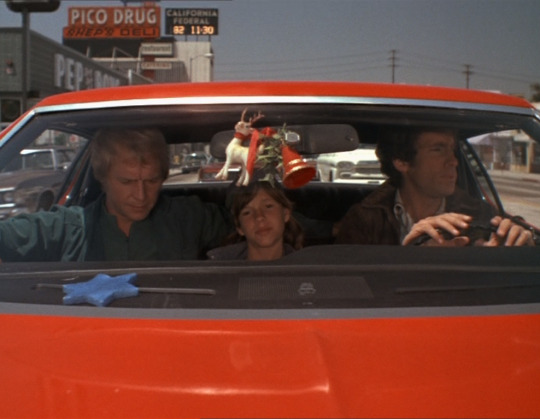
#starsky and hutch#starsky#david starsky#dave starsky#a jewish boy#this took like#9 months#starsky is jewish#this is over 6000 words whoops#my posts
89 notes
·
View notes
Text
prejudice in fantasy lit and the use of metaphor
reallybigshadowhunterstvfan said:
what can you say about making Simon a shadowhunter, Mrs Clare? it seemed odd to me that after a whole series of battling for equality between species/races, the downworlder had to become a shadowhunter. not only he basically ceased being a minority, he also became a part of a privileged community, and it just didn't sit well with me.
Just for the record — I’m not Mrs. Clare; there is no Mr. Clare. I am married, but my pen name is not my husband’s property. :-)
I think this is a very interesting question that brings up a ton of issues, but there are some aspects of it I’d love to clarify — for instance, I am puzzled at calling Simon “the Downworlder.” Is he more a Downworlder than Magnus? Things like that actually are really important when discussing stories — if he were the only Downworlder in the story, that would be one discussion, but he isn’t, and therefore his story does not speak for the experience of all Downworlders or even a small fraction.
I am sorry you were surprised negatively by Simon’s story in TMI. Simon never wanted to be a vampire — he always hated it, and unlike Raphael and Lily, he never joined the community of vampires but instead spent all his time with Shadowhunters. Being a Daylighter had already changed him from being any kind of regular Downworlder, as did bearing the Mark of Cain: both made him even less “the Downworlder” and more of an anomaly. It also separated him from the other Downworlders, who treated him with distrust. In my experience, very few readers expected Simon to remain a vampire, given that it was something he never wanted or got used to, and that it was not his dream. More on that in a bit.
As to the question, to me the suggestion that Shadowhunters are “the privileged” and Dowworlders are as a block “the marginalized” — instead of being a complicated metaphor in which they sometimes but not always stand in for people who have had their rights curtailed — overly simplifies the situation. It is an argument seems to ignore the fact that in fact, humans exist along axes of privilege and marginalization: that people can be privileged in one way and marginalized in another and that when Simon becomes first a Downworlder and then a mundane and then a Shadowhunter, he is not moving clearly from marginalization to privilege, but rather exchanging some types of privilege for others (he remains white as a Downworlder, and is a Daylighter), and exchanging some types of marginalization for others (the marginalization of being a Downworlder for the marginalization of being a mundane-born Shadowhunter and a Jew in a world where Shadowhunters are meant to have one religion).
Because the argument disclaims spectrums of privilege and marginalization, it also suggests that the world of the Shadowhunter Chronicles is one in which there are no gay or POC or trans people in existence; one in which there is no racism, homophobia, ableism, cis privilege, or bigotry against the neuroatypical. But that is both problematic erasure, and also not true of these books. Downworlders don’t stand in for people of color or LGBTQ+ people because people of color and LGBTQ+ people are in the books; they have not been subsumed into metaphor. (I know the showrunners said there was no homophobia in the Shadowhunter world, only warlock-phobia, but that’s the show, not the books, and it has a different world and world-building. I notice this is a question I get since the show came out, and I sometimes wonder if it’s a question of confusion between the two different universes? It’s easy for that to happen.)
Fantasy prejudice metaphors are complex and confusing and they rarely work as a one to one comparison (in other words, there is a difference between saying that this fantasy situation is reminiscent of this real world thing and saying this fantasy situation is exactly the same as this real world thing. For instance, one of the really interesting things about True Blood is that it made many deliberate parallels between “vampire rights” and GLBT+ rights — referring to vampires “coming out of the coffin” and “God Hates Fangs” on church signs. However, its vampires were also often violent predators who killed and ate people. The argument that Simon “basically ceased being a minority” (while, somehow, remaining Jewish) is similar to making an argument that True Blood was saying that gay people kill and eat their neighbors; I’m fairly sure in fact, they weren’t. They were reaching for a resonance — the echo of a real world situation that would give a layer of relatability and meaning to their points about difference. But they were not creating a literal “these things are the same” comparison or they wouldn’t have had vampires chewing off people’s heads.
So: are Downworlders discriminated against? Yes, sometimes, by Shadowhunters, who are a small specific group. Do they “stand in” for a specific minority group? No, they cannot, because they are accessible as a metaphor to any marginalized group or groups whose rights have been abridged. Also: the world at large does not discriminate against Downworlders because they do not know they exist, nor do they privilege Shadowhunters because they don’t know they exist either. It would be one thing if this was a high fantasy and Shadowhunters and Downworlders were all there was, but these books are set in our world, and the characters experience real-world bigotry, racism, homophobia etc. because of it.
Alec sighed. “Sorry to wreck your vision of our happy family. I know you want to think Dad’s fine with me being gay, but he’s not.”
“But if you don’t tell me when people say things like that to you, or do things to hurt you, then how can I help you?” Simon could feel Isabelle’s agitation vibrating through her body. “How can I—”
“Iz,” Alec said tiredly. “It’s not like it’s one big bad thing. It’s a lot of little invisible things. When Magnus and I were traveling, and I’d call from the road, Dad never asked how he was. When I get up to talk in Clave meetings, no one listens, and I don’t know if that’s because I’m young or if it’s because of something else. I saw Mom talking to a friend about her grandchildren and the second I walked into the room they shut up. Irina Cartwright told me it was a pity no one would ever inherit my blue eyes now.” He shrugged and looked toward Magnus, who took a hand off the wheel for a moment to place it on Alec’s. “It’s not like a stab wound you can protect me from. It’s a million little paper cuts every day.”
***
“He hurt you. It was a long time ago, and I know he tried to make up for it, but—” Bat shrugged. “Maybe I’m not so forgiving.”
Maia exhaled. “Maybe I’m not either,” she said. “The town I grew up in, all these spoiled thin rich white girls, they made me feel like crap because I didn’t look like them. When I was six, my mom tried to throw me a Barbie-themed birthday party. They make a black Barbie, you know, but they don’t make any of the stuff that goes with her—party supplies and cake toppers and all that. So we had a party for me with a blonde doll as the theme, and all these blonde girls came, and they all giggled at me behind their hands.”
***
If we carry the theory through (Shadowhunters are THE privileged, Downworlders are THE marginalized) that means that Alec, as a gay Shadowhunter, is more privileged than Simon, a straight vampire. That Ty, who would be locked in a mental institution if the Clave discovered his autism, is privileged beyond white, rich, immortal and powerful Malcolm Fade. It’s saying that when Cristina encounters a wealthy, white, straight, misogynist male werewolf in Lady Midnight who tries to force sexual attention on her, she, a Latina woman, is the one who is the privileged character because she is a Shadowhunter and he is a Downworlder (though Sterling has arguably, given that he lives outside the supernatural world, never experienced a whit of prejudice because of it.) So I’m sure you can see where the problem lies.
It also erases Simon’s Judaism entirely. Stating without caveat that Simon has become “part of a privileged community” means ignoring the fact that Simon is Jewish; that he decides in Tales that he will continue to practice, and that he was the only Jewish protag written by two Jewish authors that I’m aware of having been on the bestseller lists last year. He didn’t think about being a vampire as he was preparing to transform — he never wanted to be one or consented to be one, nor was he part of the community, as Raphael constantly pointed out — though he does later think of having previously been a Downworlder when interacting with vampires and Shadowhunter prejudices. He thought of the important thing to him: his Judaism, which he both couldn’t and wouldn’t give up. To me it is personally painful to think that for any reader, Simon’s status as a vampire is more significant than his status as a practicing Jew.
I think sometimes it is possible to invest yourself so heavily in a metaphor that you forget the real world that surrounds the metaphor and the flexibility of metaphors in general. The Shadowhunter/Downworlder situation could stand in for the systemically privileged and marginalized of our world: sometimes it does. However it also can stand in for the way totalitarian governments abuse their own people: there are echoes in Shadowhunter history and current events of the Cambodian genocide, of Stalinist violence against intellectuals and resistors. There are also echoes of police brutality — what Shadowhunters have is the privilege of the Law, specifically: the Law is what allows them to enact bigotry in the name of justice, and when they abuse their jobs, it has resonances of the way police can abuse their jobs and use the privilege conferred on them by their authority to murder and abuse the helpless and marginalized. There are also echoes of the way soldiers carry out immoral orders given by superiors: the Shadowhunters are taught to be obedient to the Clave, and one of the ways we know who our Team Good is in any TSC series that they question that obedience. All of these are echoes and resonances: they are not saying that the Shadowhunters are the police, or the US military, or the Khmer Rouge; the resonances provide context and hopefully add a sense of realism to a situation that is fantastical in its nature.
(It’s also a wise idea not to so totally buy what the Shadowhunters are selling about themselves. They think they’re special and better and awesome, but the books constantly question and problematize that. Shadowhunters also pay a high high price for their runes and their sense of superiority: they die young and often and experience brutal constant violence and the pressures of a repressive society that allows for little divergence from an idealized norm.)
There are reasons that the Downworlders were never constructed to be a specific marginalized group and their situation was never meant to be limited in its relatability to one situation— for instance, it’s very hard to not look askance at the argument that Downworlders are meant to be specific “race” when you can become a Downworlder and then stop being one: when you can, as Simon does, change what kind of magical creature you are, because there is absolutely no correlation between that and what race or ethnicity means in our world.
So yes, Simon becomes a Shadowhunter: however, what I don’t see acknowledged here is not just his ethnicity and religion, but the fact that he becomes a Shadowhunter partly because he is aware of the prejudice of Shadowhunters, and fights against the bigotry they show not just to Downworlders but also to their own. He is part of Magnus and Alec’s Shadowhunter-Downworlder Alliance. He continues to work for change from within the system, arguably something almost no one else could do, because there are almost no other Downworlders who have become Shadowhunters. It is odd to me to consider Simon as simply ascending to a height of blithe privilege when he is fact much more like someone who has become a police officer in order to root out corruption and racism in the police, and brings his own knowledge of marginalization (which he still experiences) with him.
That is why Simon in Tales from the Shadowhunter Academy is constantly fighting and bending the rules in the name of his evolving social conscience, though I understand if you haven’t read TfTSA. One of the things about having had a flood of new readers enter fandom because of the TV show is that I’ve seen a lot of arguments based on the idea that TMI is the entire story of Downworlders and Shadowhunters, or the entire story of these characters. I see people talking about characters getting a happy or sad ending in TMI even when those characters go on to feature heavily in the sequel books and could by no reasonable account be considered to have any ending, happy or sad — unless you thought TMI were the only Shadowhunters books that existed rather than a chunk of a larger ongoing mythology. In no sense has Simon’s story ended: you have no idea if he will remain a Shadowhunter or not. Perhaps if you consider the fact that TMI is not a story that has ended for Simon, but rather one that continues, the fact that he has now been two magical species and might well move on to become another will sit less poorly with you? After all, this is not “after a whole series of battling for equality between species/races” this is “in the middle of a whole series of battling for equality between species/races.” Usually the middle of a story isn’t the place it’s best to draw all your conclusions from. :-)
1K notes
·
View notes
Text
“Hope for New Life” based on Isaiah 11:1-10 and Luke 1:39-56
It is common to call the writer of the Gospel of Luke... Luke, which makes plenty of sense. It isn't likely to be historically accurate, but it is pretty simple to remember. Whatever the writer's real name was, the person who wrote the Gospel of Luke and its 2nd volume the book of Acts, is said to be the best writer in the New Testament. From my perspective I can tell that Luke does great work with foreshadowing, telling stories within stories to enrich both stories, symbolism, and themes. However, the really good stuff, I'm told is in his Greek vocabulary and syntax which are simply just outstanding. “Luke” was a VERY well educated person, and a master of the craft of writing. Given how small the percentage of literate people were at that time, being so well versed as a writer indicates not only brilliance and skill but also power and privilege. One simply would not become that great of a writer without a lot of access to unusual levels of resources.
Luke is probably my favorite Gospel writer, and I love Luke for his emphasis on people who are poor, marginalized, and vulnerable, and because they fit those categories, the women. Luke tells the story of my faith, presenting Jesus as an ally to those most in need of rescue, and as an organizer able to help people rescue themselves. This has a bit of cognitive dissonance to it. Based on WHAT he writes, Luke is a writer of the people. He is empowering, noticing those society disregards, and telling the stories that the powerful don't want told. Yet, based on HOW he writes, Luke is one of society's elites.
Which sounds to me like Luke being a living example of the power of Jesus – to convince people to work together to build the kindom no matter where they begin life, to be FOR ALL the people as they grow.
Isaiah was a prophet, and from what I can tell, a prophet is a speaker for the people. The Torah set up a society that treated people justly, and prevented an upper class from ruling over a lower class. Yet, people being people, power, money, and influence tended to coalesce at a top and become a burden to the many. God's prophets spoke out against it, and called people back to God's vision of a just, equal, and equitable lifestyle.
Which is a long-winded way of saying that we have two passages today that are “of the people” and yearning for justice. They do so in ways that can be a little bit uncomfortable. There are not simply passages that suggest “a rising tide lifts all boats” but rather ones that talk about REDISTRIBUTION of wealth1. These are passages that are good news for the poor, the lowly, and the meek ... but not for the rich, the proud, and the powerful. I find the “rising tide lifts all boats” sort of justice easier to swallow. This stuff is ... harder.
And yet, my activist friends assure me that we aren't going to get to justice only by being nice. So, let's examine these texts for wisdom. This shoot that come from Jesse in Isaiah, have you noticed that it comes AFTER the tree has been cut down. This is a sign of hope after destruction and hopelessness. The passage as a whole feels like a cousin of last week's passage. In this case, the new offspring of Jesse (which is to say the new Davidic king) is going to be so perfectly imbued with the Spirit of God that the new King will rule as perfectly as God's own self would.
The impact of life as ruled as God would have it ruled is shockingly different. When God's spirit is in leadership, and when the people are following in God's ways, there will be peace even among animals who are in each other's food chains ;) Safety becomes the center point of this – the lamb, the kid-goat, the calf, and the human child are all safe in the presence of those most apt to harm them. This is another way of talking about not needing to be afraid, because there is no motivation to do harm. In this case, it is clear that there are no people oppressing other people, no one is “eating up” the resources of the weaker people to make themselves stronger. Security, hope, and peace are the result of God's Spirit. That's the kindom.
Mary's song hits the same notes. Mary is continuing to process that she, who is lowly by the standards of the world, is now “blessed.” She attributes this change to God, and notices that this is how God works. She says it is God's nature to do great things, to show mercy, to be strong.... to bring justice. And she names how justice comes. It is by scattering the proud and bringing down the powerful – while lifting up the lowly. It is by feeding the hungry but NOT giving more to those who already have too much. Mary's song is, itself, strong and justice seeking. She identifies with the lowly, who God lifts up. And it is even more interesting to hear that knowing that the writer of the Gospel probably identifies with the rich, and wrote her song this way anyway.
While we know absolutely nothing about Jesus's mother with any certainty, we do know Jesus had a mother. The name Mary was associated with her a few generations after his death, which isn't a great reason to assume it is true, but sort of like “Luke” we can go with it. I suspect Mary got associated with the name of the mother of Jesus because Mary is the Greek version of the Hebrew name Miriam. Miriam, the sister of Moses, has the oldest words in the Bible attributed to her, and saved her brother so he could save the nation Israel. Associating Mary with Miriam is A-Ok with me.
Other conjectures we can make about Mary include: she was Jewish, she was from Galilee – most likely Nazareth, she was poor, and it is likely she was young. She may have been a very faithful Jew, as Judean settlers were intentionally reclaiming Galilee for Judaism around that time, and the ones who went were often the ones who were committed to the cause. She also might have been influenced by either the Roman Empire's violent destruction of the nearby city of Sepphoras in her childhood or by the radical Jewish teachers in the Galilee who taught that the God of liberation was going to liberate again. In any case, while the leaders of the Temple during her lifetime were appointed by Rome and the “official” religion had been compromised, it is possible (probable?) that Mary knew a faith that was untainted by the influence of power.
Which is to say, that while Luke wrote the words we hear today, and put them into Mary's mouth for our story – they MAY well reflect her faith itself. At the very least, Mary's song words as an incredible foreshadowing of the power of God that people saw in Jesus, and I believe Jesus's faith was likely formed by his mother's.
In Mark, Jesus is referred to as Mary's son which is unusual in that he was not referred to as his FATHER'S son. With the presence of a punishing military force nearby, before Jesus's birth, there are some particularly awful possibilities about his father. What we know is that at some point Mary was pregnant, expecting a child, and likely pretty scared. I say that because maternal mortality rates were high, infant mortality rates were high, and resources in Nazareth were scarce. It is very likely that Mary herself was hungry, including during her pregnancy and while she was breastfeeding Jesus. She had seen extreme violence from the Empire, and had reason to believe it could come back at any time. She MAY have been facing the possibility of being ostracized from her community. Thus, I think it is fair to assume she was scared.
Even stripping away most of that, scared seems right. For years, Kevin and I have struggled with some big questions: is it OK for us to choose to bring a child into this world knowing the dangers of Global Climate Change? Is it ok for us to choose to bring a child into this world when there are other children who need to be parented? How much capacity do we have to offer care and support for a child given our other commitments?
After long talks, prayer, and good counsel, we decided that our ideal family would include a child born to us and a child adopted by us. So we started trying to have a child and.... well, nothing happened. Eventually we made an appointment with an adoption lawyer, and decided to try private infant adoption. We filled out paperwork, got background checked, had a home study, and were ready to sign a court petition requesting that we be approved to be able to become adoptive parents when we learned that I was, in biblical phrasing, “with child.”
Now, I live in the 21st century, with pretty great access to resources. While our country is weaker than it should be, particularly in the care of women of color, compared with ancient Galilee we have low maternal mortality rates, low infant mortality rates, plenty of food, and low threat of violence. Yet as an expectant mother, I'm scared. While I find it excessive to overly identify with “Mother Mary,” preparing to parent has certainly helped me see why she's so popular. Also, why she has every right to be scared. We have been wondering how on earth will we prepare a child to be kind, compassionate, and moral in this crazy world? How will we teach them of God in ways that feel relevant while the world shifts under our feet?
Let me assure you that we did NOT sign that paperwork and adoption is officially on hold. Let me also admit to you that being the pregnant pastor of this church for the past two months hasn't been the easiest thing I've ever done. I haven't been puking (WIN) but I have been constantly nauseated, and instructed to eat every hour. I've been exhausted and my emotional resources have been down. At the same time, I have experienced significant collateral friendly fire as this church has worked together on the reality of our budget deficit.
Between the friendly fire and being less resilient than usual, I have spent time considering if pastoring this church - or even being a pastor at all – continues to be the right path for me. Some of this is simply about parenting: I'm nervous about being away from home 4 nights a week like I usually am now. Some of this is about ministry’s demands: what will it mean to have to establish the sort of boundaries my child will need, and what will I do when the needs of the church are in conflict, and what will happen when someone feels that their expectations aren’t being met? Some of it is about our child and this church. On one hand I can't imagine any church but this one being part of raising our child. I love the way children are cared for during worship. I love our Sunday School and its teachers. I love the way children are treated here, and I love the ways God is understood and taught here. However, on the other hand, my stress level has been sky high, and recently I've seen a lot of behavior I wouldn't want a child to learn about much less associate with this church. So I've been wondering, is this a safe and secure place for a child – our child – to learn about God? Will this place fulfill Isaiah's vision of a child being able to put their hand in a snake's den safely?
In slow, careful deliberation, with conversation, and consultation, and prayer, and a LOT of obsessing and worrying, I've decided not to give up on ministry just yet. Then, even more slowly, I realized that – for now – this church is worth the pain. I simply love you all. Furthermore, I don't believe that this church IS its worst behaviors. Dear ones, I believe that this faith community is an expression of the kindom of God. I believe it is a little bit of Isaiah's vision, and has the capacity to build the world into one of peace and justice. I'm well aware that we have lots of hard times ahead (and I am terrified of the boundaries I'm going to have to have as a parent, please be gentle with me) but I believe you are worth it.
So, anyway, I see why a prospective parent would be scared. And I am gaining a new appreciation for the ways in which a new generation provides new opportunities: 1) for regeneration, 2) for making right the things we haven’t gotten right yet, and 3) hope for the future. We are hoping to raise a child to know God's love, follow Jesus, and speak with and for the people. And I find myself reflecting on how I hope this community will continue to exist and teach and raise up future generations to do the same. Given all this, I see why a prospective parent would choose to stick with the God of Liberation, of Hope, and of Peace. And I see why Mary was amazed at her luck in getting the chance to do so. Being a part of the work of God is a blessing and a great opportunity. Thanks be to God. Amen
1 Someone pointed out after worship that a rising tide may lift all boats, but it doesn't help people who don't have boats.
#Thinking Church#Progressive Christianity#FUMC Schenectady#UMC#Sorry about the UMC world#Rev Sara E Baron#Magnificat#Mother Mary#luke#my boyfriend Isaiah#rising tide
0 notes
Text
advent, power, and bodies that matter
an opening introduction to a series of Advent contemplations leading through Christmas, into Epiphany.
I have been thinking a lot about bodies this year. Bodies have been all over the headlines, so maybe you have been thinking a lot about bodies also. Maybe you have watched shaky phone footage of unarmed Black bodies being gunned down in the street. Maybe you have heard a lot about how powerful men have sexually assaulted bodies of women in their lives.
The human body is a site of great tension. Firstly, there is something sacred about human bodies. We frequently intuit that bodies are precious, deserving and requiring care, and it pains us so much to see bodies around us so disgracefully violated or brutalized. Secondly, however, there can be something really terrifying about bodies – bodies, which are capable of enacting this type of violent dominance over other bodies. Nuclear weapons are the result of human bodies as much as hospitals and schools are.
If one takes seriously the claims of rigorous science, then we can recognize that bodies were shaped by the time and space within which they evolved. The environment over thousands and millions of years have yielded human beings capable of great love and nurturing, but also human beings capable of great brutality and violence. The notion of ‘falleness’, to my mind, is an honest recognition of this human capacity for violence and cruelty, particularly in circumstances of highly unequal power.
Beyond the last million years of hominidal evolution, human bodies exist along an even larger timeline of cosmic processes, within an unimaginably enormous universe whose outer limits are accelerating farther and farther away beyond any distance we are likely to be capable of probing in the near future. The magnitude of time and space possibly gives us the impression that maybe there’s nothing much to fuss about when it comes to human bodies. Maybe we’ve just gotten carried away, and maybe our fixation on human bodies is a form of narcissism that simply has yet to be overcome.
But I think this is a failure to recognize that human bodies are a mysterious thread within an even more mysterious tapestry, which is biological life on this Earth. Sure we may speculate that biological life does likely exist elsewhere in this universe. But the fact that we have found it so difficult to encounter in the short time we’ve been exploring space as a species, does reveal that biological life is somewhat rare, in the sense that it composes a very tiny almost negligible proportion of the universe. Does its negligible size signify its negligible importance? Marilynne Robinson beautifully wrote:
“Say that we are a puff of warm breath in a very cold universe. By this kind of reckoning we are either immeasurably insignificant, or we are incalculably precious and interesting. I tend toward the second view. Scarcity is said to create value, after all. Of course, value is a meaningful concept only where there is relationship, someone to do the valuing.”
The “puff of warm breath” is tongue in cheek reference to James 4:14: “Yet you do not even know what tomorrow will bring. What is your life? For you are a mist that appears for a little while and then vanishes.” Yet even with the demise of the human species in sight, or biological life as we know it, it is beautiful to contemplate that the miracle of biological life (including the emergence of human bodies) ever happened at all. In contrast to Ray Brassier’s sort of nihilism that believes that because nothing will endure, nothing is worth our time, John Caputo’s ’nihilism of grace’ sees nihilism as a gift, the very precarity and fragility from which life derives its value. It’s important precisely because it is so finite and rare. This finite nature of life provoked me to contemplate death last Advent.
So maybe what is often cynically mislabelled as anthropocentric narcissism is in fact touching on something important. Beyond just biological life, maybe the temporality of our solar system, in whatever duration it lasts for, is beautiful nonetheless. In all its imperfections as a mere blip in the vastness of time, it still permitted something as tiny but precious as human love to flourish.
But its not all roses out here. There’s a lot of suffering too. And if human love, in its tiny negligible existence within the vastness of the universe is radically precious and dare I say important, so then human suffering may be thought of as immensely important also.
For some people of faith, the portion of the Earth’s orbit around the Sun we currently inhabit is recognized as Advent. It is a time of waiting. Waiting in anticipation. An anticipation that dares to commit an act of imagination, and to host a world other than the one that is before us. To believe that another world is possible. This is a time that some people of faith contemplate Incarnation. That is, the embodiment of God’s love, peace and justice, on Earth. Both in the past, and in the future.
Yet ‘incarnation’ can be a sensitive topic. It’s of course not the place of Christianity to set the agenda for seasonal spiritual contemplation, nor to translate its religious grammar into the language of other faiths, as a way of explaining other faiths. There’s always a risk of subsuming another faith’s distinctiveness into the supposedly ‘universal’ meta-narrative of Christianity. I do feel though that what Christianity refers to when it speaks of incarnation is deeply related to themes of other faiths, particularly Judaism. (I have yet to read John Hick’s “The Metaphor of God Incarnate”, though I intend to read it next Advent. But I hope to avoid the approach Hick is known for in interfaith dialogue.) Incarnation more generally is about this rather old idea of God dwelling with us, an ever present theme in the Tanakh. So too, the ‘coming of the Messiah’ is a central theme in traditional Jewish faith.
Elie Wiesel, in his memoir “All Rivers Run to the Sea”, recounted a joke told by Martin Buber (although there seems to be some agreement that it’s an interfaith moratorium formulated by Wiesel himself that he projected back onto Buber):
“My good friends, what is the difference between you and me? Both of us, all of us believe, because we are religious, in the coming of the Messiah. You believe that the Messiah came, went back, and that you are waiting for Him for the second coming. We Jews believe He hasn’t come yet, but He will come. In other words, we are waiting. You for the second coming, we for the first coming. Let’s wait together.” After a pause, he said, “And when He will come, we will ask Him, have you been here before?” Said Buber, “I hope I will be behind Him and I will whisper in His ear, please do not answer.”
I don’t mean to place this fanciful story here to downplay the coercive force other faith groups often feel during the so-called ‘holiday season’. Slapping a new label on the festivities of this time of year (’happy holidays / ‘holy days’), does little to address the fact that Christianity (at least in its shallowest form, as a dominant cultural force of empire) has been allied with coercive power for centuries, and that the global economy in many ways is still largely structured around the Western Christian calendar. Tomoko Masuzawa has even shown how the category of ‘world religion’ has its roots in the fairly racist philological work of Christian supremicists, and continues to shape academia today.
Hauerwas and Willimon, in their seminal book Resident Aliens, write about one of the notable shifts away from this government-mandated Christianized culture:
“Sometime between 1960 and 1980, an old, inadequately conceived world ended, and a fresh, new world began. We do not mean to be overly dramatic… When and how did we change? Although it may sound trivial, one of us is tempted to date the shift sometime on a Sunday evening in 1963. Then, in Greenville, South Carolina, in defiance of the state’s time-honored blue laws, the Fox Theater opened on Sunday. Seven of us—regular attenders of the Methodist Youth Fellowship at Buncombe Street Church—made a pact to enter the front door of the church, be seen, then quietly slip out the back door and join John Wayne at the Fox… That evening has come to represent a watershed in the history of Christendom, South Carolina style. On that night, Greenville, South Carolina—the last pocket of resistance to secularity in the Western world—served notice that it would no longer be a prop for the church… Before the Fox Theater opened on Sunday, we could convince ourselves that, with an adapted and domesticated gospel, we could fit American values into a loosely Christian framework, and we could thereby be culturally significant. This approach to the world began in 313 (Constantine’s Edict of Milan) and, by our reckoning, ended in 1963.”
Hauerwas has been a prominent opponent of Christianity allying itself with what he perceives to be all illegitimate power. This movie theatre opening on Sunday offered a new opportunity for the Christian faith to divorce itself from the power of civil religion. The practice of Sabbath must be an intentional task, not one mandated by a coercive force from above (i.e. the civil religion of government). December 24-26 as a ‘Public Holiday’ and consumer capitalist festival might better be left as ‘Happy Holidays’, than as a festival bearing the name of poor peasant refugee child from the Middle East who grew up to speak of flowers clothed more beautifully than Solomon and critiqued the power systems of his day. Many Christians are rightly embarrassed that this time of year (full of rampant consumerism) is associated with Jesus. Jesus is the reason for this season of holiday and Boxing Day shopping hours that keep minimum wage employees away from their loved ones and Western consumer habits burdening more of our planet’s ecosystems? I really hope not.
Christmas has been co-opted by the powers that be, both governments and MNCs. One of the things that initially attracted me to Hauerwas was that he was a theologian that engaged seriously with the work of Foucault. Foucault was profoundly life-changing for me, and his theory of power-knowledge dynamics gave me a framework for understanding my religious upbringing. It critiqued not only my faith’s regimes of truth, but also the regimes of truth of ‘scientific rationalism’ and ‘secular modernity’. Hauerwas, in engaging with Foucault, has immense sensitivity to power. He wrote:
“From Foucault's perspective, the Panopticon is no less a disciplining of the body than torture. In some ways torture is less cruel because at least when you are tortured you know who has power over you. In contrast, the Panopticon is a machine in which the one whose body is subject to such an unrelenting gaze becomes the agent of their own subjection. Accordingly, the body so subjected becomes disciplined to be what the gaze of those in power desire without their power ever being made explicit.”
Associating Jesus with what has become the holiday season is a deeply contradictory endeavour. Colossians 2:15 reads: “And having disarmed the powers and authorities, [Jesus] made a public spectacle of them, triumphing over them by the cross.”
This sensitivity to implicit power relations and disguised oppression is growing. There is an exciting level of consciousness emerging around us, and victims are gaining ground on publicly showing how their bodies were so unjustly violated and the disarming of oppressors is a continuing and arduous journey. The shift in political views I experienced in my own life is the result of many hardworking people who took the time to talk openly with me about these important problems of power.
The opening up of countless numbers of sexual-assault cases this year is a sign that there is an important growing awareness of the sacredness of our bodies. The feminist theologian Jane Schaberg, in her book The Illegitimacy of Jesus, made a carefully researched proposal that Mary was possibly raped by a Roman soldier, and Gospel writers like Matthew and Luke were aware of the so-called ‘illegitimacy’ of Jesus as they delicately put their texts together. As Jesus is often associated with Moses as leading a sort of Exodus from slavery, Schaberg’s speculation slightly resembles Freud’s theory that Moses’ father was Egyptian in “Moses and Monotheism”.
I have not read Schaberg’s book on this topic, but encountered a summary of it in the end-notes of a book by Peter Stevenson and Stephen L. Wright called “Preaching the Incarnation”. I want to be careful treading around an issue of such immense sensitivity, especially for my evangelical friends. Someone apparently lit Schaberg’s car on fire one night over her book, so this is obviously very controversial terrain.
Before even going into Schaberg’s argument, I want to point out that I believe, like many today, that historically Christian notions of ‘virginity’ are problematic in many ways, which I will not get into here. Contemplating the term virgin this week, I was thinking we would mind our language well and use the right words, to say: if Mary was raped, she did not have sex. She was raped. That is not sex, it is rape. Rape is not sex, it is violence.
In any case, it’s fairly well known that the original Hebrew word ‘almah’ in Isaiah just means ‘woman’ and not ‘virgin’, and the Septuagint translation brought in the ambiguous Greek term ‘parthenos’ which more often means ‘virgin’. Wright and Stevenson (in Preaching the Incarnation) point out that the citation of Isaiah 7:14′s “Behold a [parthenos/virgin/woman] shall conceive” should have an original meaning, even according to standards of Conservative theology, before it takes on its prophetic meaning as pointing to Jesus. So if one interprets the verse literally, in its original meaning, then Jesus’ ‘virgin’ birth could not be considered unique. Anyways, R.T. France (in his commentary on the Gospel of Matthew) suggests there is no clear semantic distinction between ‘almah’ and ‘parthenos.’ For example, after Dinah is raped in Genesis 34:2-4, she is still referred to as a ‘parthenos’ in the Septuagint.
Anyways, Schaberg’s case begins with Celsus, a second-century anti-Christian Greek philosopher whose work survives through excerpts cited in Origen’s refutations against his work “The True Word”. Celsus claimed that some Jews identified Jesus’ father as a Roman solder named Pantera. Schaberg’s proposition is that maybe Celsus was right. But for Schaberg, it’s unlikely that Mary’s encounter with the soldier was an affair (as Celsus puts it), but rather, given the colonial power dynamics, Mary was likelier raped by that Roman soldier. Schaberg explores an allusion Matthew makes to Deuteronomy 22:23-27, a law concerning the rape of a betrothed virgin which would have required Joseph to either distance himself from Mary or stone her. Schaberg, however is not rejecting the account of the Gospel writers, but interprets Isaiah 7:14’s “Behold a virgin shall conceive” to mean that a woman who is currently a virgin, will eventually become pregnant by natural means, and then conceive a son.
For more of Schaberg’s observations (including the four ‘disreputable’ women mentioned in Mary’s genealogy - e.g. Bathsheba, the reference of Jesus as the “Son of Mary” in Mark’s gospel, the parallel language between the Magnificat and Deuteronomy 22, and the silence from Paul and John’s gospel concerning the virgin birth) this Slate article written by the Episcopal priest Chloe Breyer is worth checking out.
While I understand that the majority of historical scholars believe Schaberg’s speculations to lack substantial evidence to bear any significant weight, I do think her work still functions as a wonderfully creative site for Midrashic contemplation.
Celsus claimed that Mary was convicted of adultery. It may very well be possible to imagine a young Jewish woman garnering a reputation as ‘seductress’ after being raped by a Roman soldier, finding herself being victim-blamed like so many of today’s survivors of rape and sexual assault. Can you picture the media pundits of Nazareth saying: Mary was obviously seducing this Roman soldier by wearing her shawl in this particular way, or was irresponsible for walking around a certain part of town at a certain time of day, or she could have resisted if she wanted to, she could have just kept her knees together, or she deserves sympathy but there’s nothing we can do but face the fact that she is ‘less valuable’ a human being now and does not deserve to ruin the reputation of a respectable man like Joseph. Even if one takes the traditional interpretation of the virgin birth at face value, one cannot deny that the talk going around town would not have been as much concern over Mary as a possible victim of rape, but rather over her ‘chastity’.
Jesus was raised by a mother who may have faced a sort of victim-blaming stigma all her life with the suspicious conception of Jesus. There was a meme I saw floating around feminist social media communities that fits so well with this idea that Jesus would have learnt well to be suspicious of victim-blamers, being raised by a mother of disreputable status. The meme said something along the lines of: Jesus didn’t blame women for their objectification by telling them what they should or should not wear, but he told his disciples that if their eye causes them to sin, they should pluck it out.
Jesus must have eventually understood the fear and trembling that his mother Mary felt as she faced potential stoning while carrying a baby she believed to be the Messiah. Kierkegaard called Mary a knight of faith because she could not explain her situation to anyone. It would just come across as absurd in such a patriarchal society. Sound familiar? How many victims of rape and sexual assault have felt like a Kierkegaardian knight of faith, resigned to silence, unable to explain the terrible burden they carry because it is beyond the comprehension of a sexist patriarchal world around them, yet still believing that they could one day do something to help other women never have to face the trauma they were confronted with in their own life. The #MeToo campaign has opened up something very important, though there’s still so much pain and hurt out there and so much more that needs to be done.
Advent to me is a yearning and expectation that all oppression shall cease. In a series of posts this Advent, I wish to continue some theological contemplations on incarnation. What implications do Advent and Christmas have for the way we treat bodies? What does it mean for Jesus to be a victim of state-sanctioned violence, as the Maccabean martyrs were, whom Jews remember during Hanukkah? And how does the expectation of Resurrection by Jewish martyrs tie these two faiths together in such a way by which sites of solidarity can be fostered in faith communities resisting the ways of empire, which so often degrade marginalized bodies? In yearning for a future where all oppression shall cease (i.e. all the sins of the World will be taken away), what ways are Incarnation and Atonement deeply entangled? What do the anthropomorphic sketches of God in the Tanakh have to do with incarnational ideas hanging around first-century Judaism?
I hope to explore some of these questions in the coming weeks, leading up to Epiphany. Please join me if you have a chance, and call me out on anything you feel is problematic. If anyone has read this far, I owe them a lot more than a fair hearing.
0 notes
Text
24: Movie Review of “Religulous”
The movie “Religulous” is a comedic documentary, hosted by Bill Maher, in which the religions of Christianity (primarily), Judaism, and Islam are rigorously questioned. Though the questions are simple and seem to be practical, they totally contradict the religions in question, and the religious members tend to become frustrated with the questions. Maher also goes over typical themes related to these religions such as, religion and money, homosexuality and religion, miracles, religion and nationalism, and different sects of Christianity. He criticizes these things, often pointing out their impracticality or contradiction with science, by directly confronting religious followers who believe in these things. Though Maher’s argument for Atheism seems to makes sense from a material standpoint, it is one sided and he does not consider religion as a beneficial thing whatsoever. He points out contradictions and man-made beliefs in the religion and criticizes them as well, yet he doesn't consider any beneficial aspects to religion. His argument is convincing, but it isn't complete and open. He critiques religion, but not for the spiritual benefits or the good morals it teaches us. In the beginning of the documentary, Maher goes to a church where he asks the members: Do you get bothered by things in Christianity that aren’t in the Bible? The small church has faces of confusion, surprise, and frustration. Bill Maher further elaborates that things like original sin, immaculate conception, and virgin birth aren’t even in the Bible, yet they believe these things as if they were in the Bible, and the word of God. Some members of the church are immediately angered by this and leave, not even willing to be open to the question. The ones who do stay have trouble answering the question and become frustrated; answering this question in terms of faith, or horrible scientific explanations to try to prove that Jesus was born from a virgin. Here we can see that Maher is promoting doubt in the followers of the religion, and is blatantly trying to point out to them the flaws in their ways of worshiping. Next, Maher touches on the topic or religion and how it is related to money, interviewing a wealthy priest. Bill suggest that people donate to the church out of generosity, and the priest takes that money, which was morally given to the church, and rather then investing it back into the church or community, he uses it from himself. When confronted with this, he tries to argue that if you practice Christianity correctly, the money will simply follow. Here, the priest is trying to pose the idea that he had nothing to do with his riches, it was more like a gift from God because he was so good at practicing Christianity. Of course, Maher doesn't buy this claim, and ironically the priest showed up to the interview with a very expensive, and personally tailored, suit. Maher is trying to point out the corruption in the church, and how some priests take advantage of the good act of generosity and turn it into a money making tool. Moving on, Maher tries to snuff out the assertion that homosexuality is morally wrong in the eyes of God, for goes to a conversion therapy clinic and questions the “previously” gay manager how he believes this therapy works. Bill argues that having a sexual attraction is uncontrollable and natural, so gay people are naturally gay and it is not a matter of decision or life mistakes. So, he also points out, it is no surprise that this “conversion therapy” actually doesn't work, because to change a natural attraction to the same sex is impossible. Furthermore, Maher points out to this manager that the idea of homosexuality being wrong is in the Old Testament, but Jesus never said anything about homosexuality in the New Testament even though some Christians take this idea as the word of Jesus. The manager of the conversion therapy clinic tries to come up with counter arguments, however they are illogical and really aren't strong at all. Bill Maher addresses the idea of religion being related to miracles, saying that they are really all coincidences or fiction. To support this claim, he asks a Christian man about the miracles he claims to have experienced. He claims he has had many miracles happen to him, but he discuses one, where he holds out a cup and wishes for rain, then it does. Of course, Bill Maher laughs at this, saying that it is just coincidence, for it is obvious that rain falls from the sky and it just so happened to at that moment. Then, he asks the same man: If you want to be with God, why not kill yourself? The man replies with the assertion that everyone has a mission that God whats them to carry out much like the mission of Jonah. He begins to explain the story of Jonah, saying he lived inside a large fish for three days. Before he can finish, Maher, of course, interrupts him to point out how bizarre and unreal that would be. In this section of the film, Maher is really attempting to question the realness of these religious miracles and stories, for they either seem like coincidence or fiction according to him. To continue, Maher addresses the issue of religion and nationalism intertwining, saying these things should not mix. He makes note of the founding fathers of our country, which were very clear that church and state should be separated, and gave quotes from the founding fathers bashing religion and how it is useless to government. Yet, nowadays we seem to mix these two things together, with campaign slogans like: “A vote for me is a vote for Jesus!” But the founding fathers realized that there is a difference between being American and being Christian, however many think that America is a “Christian” nation. What Maher is trying to point out is the fact that religion can be used as a tool to manipulate people into voting a certain way, but religion and government was designed to be separated in our country. When we see campaign slogans like, “A vote for me is a vote for Jesus,” really they are manipulating the people into thinking he or she is morally good because of there religion. Though Bill Maher strongly criticizes Christianity for most of the documentary, he also briefly criticizes Scientology, the American bias and racism of Mormonism, Judaism, and Islam. Particularly to Islam, much like the Bible, he criticizes statements in the Quran which seem to be dangerous if interoperated literally. Maher talks to Muslims about the violence seen in the Quran and they tend to respond with the claim that most Muslims are peaceful and it is just a matter of interpretation. He also talks about the current events dealing with Islamic fundamentalism In the documentary, Maher brings up many issues in religion that I agree with such as, the ridiculous rejection of homosexuality in some of the Christian community, the bizarre stories in the Bible, and that religion and nationalism should not mix. For these claims, Bill Maher has a pretty strong argument supported by science and reasoning. For example, I would agree that attraction to the same sex is natural, for when we are attracted to someone we really don't have control over it. So, in the case of conversion therapy, I agree with Bill that it does not actually work, for it is impossible to strip yourself of something you were born with. When it comes to the stories in the Bible, I think they are mostly metaphors to get a point across, however, I agree with Maher when he criticizes the literal belief in these stories, which the man in the documentary seemed to do. The fact that Jonah lived in a large fish for three days is unreal, unless the world was profoundly different when he existed, and I don't believe it was. This story was most likely supposed to be a myth, that got the point across that Jonah had a mission from God that he carried out, but nothing more. Additionally, Bill creates strong arguments to suggest that nationalism should not mix with religion, using the founding fathers as evidence, for the very men who started our country believed they should be separate. This further convinced me that church and state should be totally separated. Of course, Maher brings up more claims about religion and the ridiculousness of it, which I also agree with, these are just a few. Though Bill Maher’s argument is convincing, I do not whole heartedly agree with it. I think it is very one sided, for he doesn't consider any of the good things religion can give people. Really, it is a matter of interpretation when it comes to most of the religions he talks about, and, yes, there are lots of bizarre, violent, and hateful things in the Bible and Quran, but there are also messages of peace, love, and compassion for others as well. I believe that these things are beneficial, and I also believe that many people look past all of the negative things in their Holy Books, and take what is good from it. If you interoperate the scripture in this way, and many probably do, I don't think there is anything wrong with religion. Bill Maher doesn't take this into consideration, his goal was just to bash on religion and not expose any positivity in it. Yes, Maher is right when he says that religion has many fictional things in it, but from these fictional stories, if not interpreted literally, there is good that can come from it. Additionally, he only questions a handful of religions, yet seems to make the claim that all religion is bad, which is jumping to a conclusion too quickly. Maher doesn't take into consideration the thousands of other religions in the world, yet asserts that all of them are impractical or wrong. Notice, for example, he doesn't touch on religions such as Buddhism, which kindness, love, and compassion for others are central to the religion, and enlightenment and a non-materialistic life are encouraged. For a religion like this, though they may also have fictional stories, many of his arguments would not apply because the Buddhism is accepting, advocates for generosity, and practices non-violence, similar to Hinduism as well. When it comes to his analysis of the people he interviews in the Christian faith, I agree with him, but to claim that, from these interviews, all religion is useless and all the people participating in it are wrong, is not valid and therefore not a strong argument.
0 notes
Text
The Superman in super-heroism: Tipheret in Yesod because the problem starts from need.
Before was created the yawning absence through which reality was made possible, by getting out of the way, and inviting a world to be, as if, completely devoid of The Perfect and whatever That is--
--there was no drama.
No injury. No boundary violable. No story and no crime. No world, for all this trouble is impossible in the Pure Presence of whatever perfect used to be. That was a long time ago, by definition. History is made of the bouncing and pop! that filled the absence of that initial pre-day with movement, passion, novelty and accident. The God thing that could be described was entirely problematic, mercenary according to the sensory capacities of the most honest and expressive demand, animal and then human and more human. Maybe memory, maybe dream. What’s noticed when gazing down the absence, back at the Source of all Flavors in the appendage-tips of Allah Most High. Because, lets say, there are at least two fundamentally different ways we, popularly, when not being overtly facetious or ironic nowadays use the idea of “god” --The characters we identify with fundamental popular priorities. As regional as the priorities themselves, the local Elohim.
--The real that we cannot perceive, because it’s too big and all inclusive. The actual-beyond-regional. Whatever that is, the mystery behind science, maybe trivial, maybe utterly present and involved
Either the Real, or the True that discredits the Real. The core experienced that we cannot help but notice, identify, love and fear. This what what religion and popular media both formed as tools for relating to, but also, for unmasking and ritually stripping the power of, so that we could feel like we understand enough to at least relate to, safely. The forces that insist on being Problem, Solution, or Phenomenal Mystery Theater for the whole. This is what Kabbalah, historical and ongoing, traditional and experimental, aspires to clarify, that we might be empowered to at least understand how we are relating to Being. And solving problems! This is the moral aspiration in Kabbalah: overcoming cycles through perspective. --- Hi! My name’s Yoseph and this is Pop Cartoon Kabala, where I try and relate the historic mystical language that offers to contextualize and decode the meaning behind All The Stories, in the simplest terms available, breaking them down into convenient and accessible little codenames, elaborated and associated at length later on, as has been the history of written mysticsm. Start cryptic, because you can say more with less and so you won’t get in trouble, and then let generations build up to more detail the less was understood from context. Pop media mostly eschews this model? Only for a while. Every series, every program serially produced finds its way back from it’s novel pilot distinction to Approaching the Ancient of Days, delving into genre, history or just cliche for lack of the compelling in the unelaborated novel. It’s one of the blessings of the super-modern Netflix era, the extra episodes and spaces for character-or-theme development, deleted scenes, and all the nuance that remains peripheral and thus esoteric, saved for those who love enough to long for more detail and understanding. Written esoterica, i.e. Judaism but also all the rest is characterized by its infinite and expanding corpus of Apocrypha and commentary, each one more obscure than the last until or unless it emerges as Super-Canonical and becomes a certain kind of defining text for the whole community for the rest of all time. All the books, canonical and extra-- these compilations and elaborations became the main source that most communities have for their entire connection to the original source texts, and the original and everdefined divine expressed and experienced through them. This is the virtue and danger in making anything clearer. Responsibility for the update, the main work of the Tzaddik, the Hero, the Foundation, the protagonist: authentic and balanced sensitivity, as much as could be wanted, whatever will compels and continues to compel an engagement with. In this groping for language, personification and relation, is the beginning of the euphemisms that shine with our truest will and the testimony behind them.
-----------
The Problem With People, even and especially the most sweetest amongst us: Manipulative dishonesty or unapologetic insistence on unhelpful satisfactions. It’s the sort of problem that goes until noticed except half unconsciously, making us uncomfortable until a language emerges to express the problem. This is the problem with deific language that seems to constantly demand heresy and blasphemy, just to be honest, righteous or real. It’s one of the radical kindnesses of post biblical modernity, the vicious hostility to divinity, even as much as divinity is the main voice speaking, and purest sought thing. It’s why arch-cynics can have the 10 commandments on their desks: the invitation in even the worst excesses of religious dogma is a certain amount of re-clarified honesty. And the main concern that allows fundamentalists and evangels to intrude upon Our peace is the fear that we do not even understand ourselves, what we yearn for or mean. And so, rightness swivels and moves to be, according to the natural excess that it longs to offset. Hero literature invites clarification of a certain kind of super best good. This is what a Superman is for: Truth, etc. “Justice” is clarification, resolution, a harmony purchased through effort, and even sacrifice, for clarity’s sake. Super = Tipheret & Man = Yesod. Because need is the void that pulls imaginary hero into being. Win the war, whichever war is rightest and closest. Exciting mediums of moral conflict, in which fantasies of relative scales of infinite power and success are used to express a yearning for constantly changing and renewing stories of “justice.” The main difference between the previously revealed and popularly acknowledged-as-torah torah is only in the use of the visual/verbal fusion in the emerging comic book language. --- Yoel Chajes, scion of a long dynasty of rabbinic scholars and musicians, as well as mighty whalers and religious dissenters, once gave a “vort” at his Bar Mitzva comparing the visions of the mighty G-d of Israel and his power at the Song of the Sea following the exodus, just as the sea is splitting, with King David’s victory anthem, both ritually chanted on the seventh day of Passover, when his Bar Mitzva happened to come out. To do this, he contrasted the original vision of a merely super-powerful Superman circa Action Comics #15 with the nigh-invincible demi-god that Superman would become, transitioning from leaping really high (wow! Over a building? Whoa!) to flying at light speed around the sun to go back in time at his leisure (“yeah, sure. I can do that. Whatever.”) As if to say: the same El takes on different scales of role, depending on how much we need to be impressed and redeemed. From simple gravity? Or from Life and Death themselves? The more infinite Superman’s powers are, the more responsible he is to explain why he isn’t doing more, so theological answers start to be given for why Superman must allow some bad things to happen so humanity can work their shit out. The best and wholest of these efforts range from the generous to the theodic, with the mystery laying on Where Are The Limits of Our Expectation? Paul Dini and Alex Ross’s Superman: Peace on Earth, where, at least, he does try, features a beautiful shot of Him weeping as the food supplies he was carrying to African refugees smolder around him, destroyed by a rocket fired by some faction or another, intent on controlling the food. This is contrasted by a similar frustration in Garth Ennis and John Mcrea’s Hitman #34, where Superman is weeping bemoaning his own limitation in not being able to rescue an Astronaut. In Ennis’s story, there is nothing to be done, because nature and space and limits are what they are. In Dini’s story, the problem is more just the human heart. Both stories, notably, are Christmas stories. Because Superman is a super-Christ, as is known, a Solar deity in the aspect of Tipheret, often killed and resurrected. Often limited but the virtue is not giving up. Like G-d, the more infinite Superman’s power is, the harder it is to feel good about him, because after all: he’s letting the bad structure that rules the world endure. He must have his nifty reasons always, but the more he accepts his own limits, the sooner he becomes the lame tool of stories like Dark Knight Returns, endlessly justifying the sanctity of the status quo, until the point of nightmarish dystopian demiurgency. Who feels inspired by a god like that? Only the wicked. That’s a short history of world religion, and the development of the Theology in “the” Torah for you: God/the world/good is described in a certain way, to arouse the heart to excite people to a certain truth about how good is repressed and must not be accepted as such by any one in a position to do anything about it, until the limitations of that position are recognized by, like, everybody, and the relationship towards the responsibility evolves in response to the popular interest, now easier to track than ever thanks to sales figures (er… not counting all the torrented copies, alas--)
Ignored in the context of talking about Superman is his fictionality: Why not just take His presence in the world seriously? He is a metaphor for the power that is wielded by Something, and could be wielded by Us… if only we knew how? Enter the One hero, whose victory defines us, and hopes to survive us, in every sense in that he is certainly us, once. But the first could not last there alone for long. My theory here, that every hero is Superman in the same way that every God is Yahweh is the only god that any one can worship, or hero that one can revere: whichever one we're looking at now. Superman is the Christ that always wins, that's what he means, and I reckon, what the Christ is supposed to mean. There are only three things that can happen to superman, that have been discovered, that can be the end of his infinite saga of transendence. He can become evil, fall in love, or go off into space to approach bigger concerns, not to return to earth until the final crisis. This is how many Return of Superman sagas have begun, from the failed Superman Returns movie to Rob Liefeld's Supreme pastiche, which began as a violent superman ripoff in the context of early nineties grizzle, but emerged as the introduction of Alan Moore's Kabbalistic mythologization theory, where all retreads and retcons could make sense as part of one cosmic untidy poly-continuum, a principle which would soon become normative in all comic book universes, now unfettered from the need for an internally consistent alternate-reality justifying theory. It is all just narrative now, and some patterns for that narrative have been described.
Superman can only return from his slumber or distant war for the sake of One Last Victory, at the end of which he must be honored forever. This is the difference between Superman and Captain America, someone in many ways very similar, except that Captain America is defined, upon his resurrection, by his dissonant anachronism, as opposed to superman who can never function as an anachronism for long. Superman must fully assimilate into super-competence, including socially, in order to be, and if not, he must degrade into something less-useful, an intolerable situation, from which he must flee as soon as possible, to where he can super-function again. This can be any kind of need, from the powered down adventures on Kandor, or New Krypton, or in the 30th century-- That's ok, he can handle that, AS LONG AS THERE IS A NEED FOR HIM.
This is the hall mark of the Sephiros-- they are summoned by need. On the higher levels, it's unclear whose need-- there is little distinction when everyone is in the same boat. Superman's defeat of his enemies is special, in that even his enemies tend to ultimately benefit from his victory. This total victory is beyond distinction, and climbs up the ladder to the very highest priority. Tipheret is the center of the tree, bound to the highest and lowest of it's aspirations and sources. The irony of the kabbalistic tree is the degree to which it is upside down-- it's roots are singular and monistic, it's branches ultimately more like leaves. If you want to defeat Superman, you must make his priorities change.
Therein lies the mystery of the evolving living god, the emerging better priority of Harmony: adaptation to emerging need and emerging morality, the daughter of need. Law is a boy in love with a girl named need, and seeking to impress her, and superman has never given up on his first love, the one his mother inspired: devotion to the best and most modern good. “The American way” gave up to some better term for the righteousness that superman MUST represent if he's not going to be terrible, just as Christ has to die a little in order to not be as flawed a god as his father was (and he is) before the great sacrifice. Same with Dumuzi and Horus, the elohei tipheret, who represent the new order and it's marriage to infinite power. Batman is so different somehow, the Yesod hovering over malchus, closer to where the bad world becomes good. Maybe he's as high as Daas, but no, his virtue is too much about goodness and discipline. In some contexts, he could represent something closer to gevurah, but the truth is, Yesod is where he lives. Alan Moore's thelemic Kabbalah relates Yesod to the imagination, but that's not the association that we get with it in Jerusalem. Here, it's identified rather exclusively with righteousness, piety, faith and devotion, a certain kind of grounded harmony, the perfect balance between giving for the needs of the giver and giving for the needs of the receiver, a level of true sensitivity and intimacy that the Tipherets of infinite pre-packaged perfection can never touch. Yesod comes down to kiss reality in a way that Truth never can, and this is why Batman is always going to have a deeper and better relationship with Wonder Woman than Superman will, and why Batman is ultimately more resonant forever. The Saints are always going to be cooler than the Christ, no matter how much they love each other. There is much more to say about this, and so we will (G-d willing) every day or so, for the next week and half, relating to these last few days of Sephirat Haomer, until the Pentacost. So much for intro into the middle! I’ve been working on this for while, and it’s still a work in progress. Feel free to comment, ask questions, argue, clarify, or anything. What Id’ really appreciate is as much art as y’all want to send me; this project is being published as a big Art Book eventually, and the finest of submissions here will be paid for permission to use. But more than that: we’re trying to illuminate, take the resonant and spin it into the profoundly meaningful, the core that is appreciated inside of the noise and medium clarified like pure gold. Won’t you help me? Any illustrations inspired by the words above, please.
0 notes